


Sharp ■ Informed ■ Challenging 26.6.23 Discover the Power of Volvo Volvo FM, FH and FMX Electric with the Volvo Electric range
 Volvo FM Electric
Volvo FM Electric
NEWS INSIDE
Jobs under threat
Fight to save Cross Transport p3
Return of the HGV levy

Charge payable from August p3
Fraud costs haulier £1.2m

Sisters in court over scam p4
OPERATORS INSIDE
ARR Craib Transport p3
Cross Transport p3
Foulger Transport p4
Gregory Distribution p3
Howard Tenens Logistics p4
JPA Transport Services p3
Pollock (Scotrans) p3
SI & S Hastings Haulage p4
Sprint Xpress p4
CELEBRATING SUCCESS: Road Transport Expo (RTX) triumphed at last week’s Association of Event Organisers (AEO) Excellence Awards, where it was crowned Best UK Launch Event for its 'all about the truck' summer debut in 2022.

“We have a great team at RTX and for the professionalism and commitment they have shown to be recognised is fantastic,” said Vic Bunby, divisional director at MT publisher and RTX organiser Road Transport Media.
RTX 2023 will be rolling into NAEC Stoneleigh this year from 28-30 June and is completely free to attend for visitors.
Former employees seek legal advice over compensation claims as parcel delivery firm collapses
Tuffnells staff in redundancy row
By Chris Tindall and Carol Millett
Advice for former staff of collapsed firm Tuffnells Parcels Express who are seeking redundancy and other related payments has been issued by the Insolvency Service (IS).
Individuals who had an employment contract with the business are eligible to apply for redundancy from the IS but workers and selfemployed contractors who provided services to Tuffnells are not.
Instead, the IS advised that these individuals contact the administrator, Interpath Advisory, to register as a creditor.
It aims to pay eligible claims within six weeks of receiving the application.
Tuffnells appointed Interpath Advisory on 12 June with just 128 staff out of 2,200 keeping their jobs. The remainder of the workforce at the company’s 33 depots has been made redundant.
Interpath said that following Tuffnells’ management buy-out
in 2020, the company had been navigating “a number of pressures”, including the impact of Covid-19, high cost inflation and an increasingly competitive market.
“In recent weeks, the financial position of the business was such that the company needed to seek additional financial support,” it added. “After a number of options were explored, the directors took the difficult decision to appoint administrators.
“Unfortunately, the highly competitive nature of the UK parcel delivery market, coupled with significant inflation across the company’s fixed cost base in recent times, has resulted in the company experiencing intense pressure on cashflow.”
Anger among staff was fuelled by an announcement from rival firm DX, shortly before the administration, that it had reached “a full and final settlement” with
Tuffnells in relation to alleged corporate espionage claims.
In an online petition demanding the government investigate the circumstances surrounding the firm’s collapse, one former worker said: “Not only was there no consultation, [there was] no redundancy and no last pay packet.”
Tuffnells staff from the Nuneaton depot have also approached a law firm to seek compensation.
Solicitor Aticus Law said it would work for former staff on a no win, no fee basis on large class action claims: “If Tuffnells did not comply with this obligation, and you were made redundant without notice, you may be entitled to claim compensation by bringing a claim for a protective award to the employment tribunal,” it said.
Alex Jay, head of insolvency and asset recovery at law firm Stewarts, warned that more delivery compa-
nies could follow in Tuffnells’ footsteps.
“Tuffnells’ demise is indicative of changing consumer habits driving competition in particular sectors,” he said.
“We can expect more of that in the consumer retail sector.”
Sharp ■ Informed ■ Challenging 26.6.23
Focus: regulation p8 Viewpoint p10 Dealer future p12 Partnership p16 Round table: DVS p22 Marketplace p28 MT Awards p40
REGISTER FOR YOUR FREE TICKETS AT roadtransportexpo.co.uk 28-30 June 2023 NAEC Stoneleigh
The one-stop industry event that’s all about the truck and everything related to it
28-30 June 2023 • NAEC Stoneleigh




New-look HGV levy will begin on 1 August
The HGV levy, abandoned at the beginning of the Covid-19 pandemic, is to be reintroduced from 1 August with a new emphasis on emissions, weight and time spent in the UK.
The DfT said vehicles of 12 tonnes or more driving on motorways or A roads must pay the levy. The amount charged will depend on the weight of the vehicle, including the weight of a trailer if a rigid vehicle is pulling one, its Euro emissions class, and the amount of time it spends in the UK.

Rates vary from between £150 to £749 per vehicle, per year.
The DfT said the HGV levy was aimed at making sure lorries make a contribution reflecting the wear and tear of the road network.
The levy was suspended in August 2020 to support the haulage sector and aid pandemic recovery efforts.
However, the RHA said it opposed its return and that it was a tax increase on all road haulage.
Combination of high fuel and labour costs threaten more than 100 jobs
Administrators fight to save Cross Transport
By Chris Tindall
More than 100 jobs are at risk after a Birmingham-based haulage company called in the administrators.
Cross Transport, which has an operating centre in Swadlincote authorising 20 HGVs, appointed

insolvency experts SFP to the business on 5 June.
According to official documents, it was established in 2010.
It operated a range of vehicles, from small vans up to 44-tonners and offered general and contract haulage, as well as palletised freight services.
Its last set of accounts, for the year ending 28 February 2022, showed that turnover had reduced from £22m to £16.4m and it made a pre-tax loss of £157,000.
The previous year it had made a pre-tax profit of £2.3m.
It said it employed 117 staff during the period and in a review
Haulage prices at four-year high, even though inflation still bites
Haulage prices are now at their highest rate for four years with average price-per-mile figures rising by 4.4 percentage points since February, according to a report from the Transport Exchange Group (TEG).
Its road transport price index revealed an overall price-per-mile increase of 1% in May, despite inflation finally hitting single digits at 8.7%. The report said the index had risen by 1.2% year-onyear and May’s figures are the highest for the month since the index began in 2019.
Haulage prices have also shifted
Jobs saved in pre-pack sale
The sale of a Warrington haulier’s business and assets to a new firm after it went into administration has saved 16 jobs.

of its business, Cross Transport blamed fuel and labour cost increases for the loss.
It added: “Overheads have increased in what has again been a year of significant change and overall operating profit and profit before taxation have decreased considerably versus last year.”
According to the office of the traffic commissioner, the haulier was scheduled to appear at a Birmingham public inquiry on 4 July for the TC to consider disciplinary action and the transport manager’s repute.
SFP was approached for comment.
JPA Transport Services appointed administrators Leonard Curtis on 8 June after suffering as a result of a nationwide shortage of drivers and also prolonged restrictions caused by the Covid-19 pandemic. Salary expectations of qualified HGV drivers and soaring fuel costs also took their toll and resulted in JPA falling into arrears with its creditors.
A sale of the company’s business and assets was completed to ABA Transport Services – and all 16 jobs were transferred under TUPE to the purchaser.
Joint administrator Mike Dillon said: “The pre-packaged sale achieved represents the best outcome for the company’s creditors as a whole.”
upwards slightly, by 1.3% during the month, compared to courier prices which have hit a plateau with a minimal 0.2% change.
The results contrast with the start of 2023 when haulage prices were at their lowest level for almost two years. The report said diesel price reductions were now picking up pace, with pump prices falling by 2.75% last month, seven times as fast as petrol prices.
It added that the government’s decision to allow longer trailers on the road should deliver a £1.4bn boost for the economy and cut CO2 emissions by 70,000 tonnes.
ON THE UP: Despite a “hugely challenging year”, which saw Gregory Distribution Holdings reduce its apprenticeship programme and run fewer vehicles, profit and turnover rose, aided by high-performing contracts and the integration of the Pollock businesses. The family-owned firm has more than 400 customers and operates a fleet of over 1,000 vehicles and around 2,000 trailers. Reporting its results for the year to 1 October 2022, the business revealed a jump in turnover to £335.6m (2021: £273.4m) and an 8% rise in pre-tax profit to £11.9m (2021: £11m). Within the group, Gregory Distribution saw turnover rise to £262.3m (2021: £215.5m), while pre-tax profit fell to £8.9m (2021: £9.3m). ARR Craib Transport saw turnover jump to £47.4m (2021: £43.1m), though pre-tax profit slumped to £467,000 (£840,000). New recruit Pollock (Scotrans) saw pre-tax profit rise to £2.3m (2021: £951,000) despite turnover falling to £29.3m (2021: £29.8m).
motortransport.co.uk News MotorTransport 3 26.6.23
Photo: Shutterstock
Photo: Alisdair Cusick
Photo: Tim Pestridge
Howard Tenens closes subsidiary

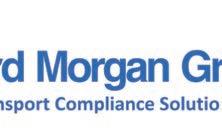
Howard Tenens Logistics experienced mixed fortunes in 2022, boosting turnover by more than a quarter but being forced to close down its subsidiary Howard Tenens (West London) after it was hit by the impact of the Covid-19 pandemic.
In its latest annual results to 30 September 2022, the company saw its turnover rise almost 26% to £106.1m (2021: £84.4m) while pre-tax profit leapt to £5.7m, up from £3.6m in the previous year.

The Stroud-based haulier, which specialises in logistics, distribution and warehousing, said these results were achieved despite the economic turmoil created by the Russian invasion of Ukraine and its impact on inflation and supply chains.
Howard Tenens (West London) suffered an 80% reduction in volume from two big customers and was dissolved in September 2022, with Howard Tenens Logistics taking over its entire trade and assets and writing off the remaining investment value of £999,000.


In its strategic report to the results, Howard Tenens Logistics said the period had seen “a healthy amount of organic growth, particularly within our transport division” driven by new business and expanding services to existing customers.
Sisters admit scam targeting Penrith operator SI & S Hastings Haulage

Advertising fraud cost haulier £1.2m



 By Carol Millett
By Carol Millett
Two sisters have admitted defrauding Penrith-based haulier SI & S Hastings Haulage of £1.2m by falsely claiming the company owed them money for advertising.

SI & S Haulage has O-licences for 13 trucks and 14 trailers and operates from three depots in Penrith.

Carlisle Crown Court heard that in 2017 the sisters – Joanne Palmer, 40, and Stephanie Palmer, 38, from Stockport – called the haulier offering advertisng space. The company secretary asked them to send some paperwork for consideration.
However, shortly after the call she received calls claiming there was an outstanding balance owed to pay for advertising. She told the caller she had not agreed to any advertising but the caller claimed she had agreed verbally and there-
fore owed money. She then was bombarded with calls every day demanding payment both via the company number and her personal mobile.

Since the company secretary was convinced that the threats would be carried out, and feared for her family’s safety, she began making payments to the sisters, the court heard.
Both sisters also targeted a shellfish firm in Bridlington, making an official there hand over almost £300,000, the court heard. They will be sentenced on 4 August.
Foulger the latest Kinaxia firm to join Palletforce
Foulger Transport has quit Palletways to become the seventh Kinaxia subsidiary to join Palletforce – following in the footsteps of Lambert Brothers, Panic Transport, William Kirk, N C Cammack, Maiden’s of Telford and Bay Freight.
EV Cargo’s Palletforce has also announced that Sprint Xpress, another East Anglian haulier, has joined from United Pallet Network.

Snetterton-based Foulger Transport will cover central Norfolk, including Norwich and Dereham, while Sprint Xpress will
cover NR postcodes around north and east Norfolk, including Fakenham and Great Yarmouth.

Foulger Transport, which specialises in general haulage, palletised freight and warehousing, operates 60 vehicles and boasts clients in retail, manufacturing, food and pharmaceuticals.
Mike Ketteringham, Foulger Transport general manager, said: “Palletforce will help provide us with the platform we need to extend network operations in the area and we look forward to leveraging the commercial opportuni-
ties that will provide.”
Family-owned Sprint Xpress operates from a base next to Norwich Airport. It has O-licences for 11 trucks and six trailers.
motortransport.co.uk News 4 MotorTransport 26.6.23
Your trusted compliance partner Compliance Audits Vehicle Inspections Transport Training Compliance Software IRTEC Accreditations Transport Consumables 01543 897505 info@lloydmorgangroup.co.uk www.lloydmorgangroup.co.uk CONTACT US TODAY
Photo: Shutterstock


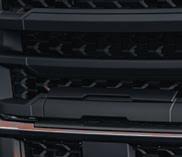

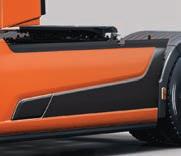
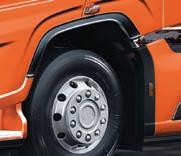
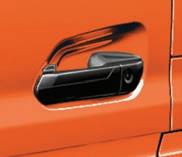
The Zemo Partership met earlier this month to thrash out the pro and cons of future fuel options
Plotting the road ahead
The Zemo Partnership held its 20th anniversary conference on Clean Air Day (15 June) at London City Hall. A panel discussion hosted by Andy Salter, MD of DVV Media International, which publishes Motor Transport and Freight Carbon Zero, analysed the debate about pure battery electric versus hydrogen fuels cells.

Salter set the scene by pointing out that if the UK gets decarbonisation wrong and breaks the supply chain, the economy would be “in a right mess”.
Peter Harris, vice president of international sustainability at UPS, agreed and argued that “as a country we need to make a decision on future technology”.
“Last-mile electrification is happening, but the big argument is about HGVs,” he went on. “This can’t be resolved by market forces alone.”
Gaynor Hartnell, chief executive of the Renewable Transport Fuel Association, said that more emphasis had to be put on the existing fleet of trucks as “they are emitting carbon now”, and claimed the “huge role” switching to lowcarbon fuels can play is “often overlooked”.
Challenges ahead
Kate Jennings, policy director of Logistics UK, said that while progress in the logistics sector had always been led by the private sector, the scale of the decarbonisation challenge was just too big for the industry to solve alone.
She agreed that operators “can reduce carbon emissions today with low-carbon fuels – but the government does not recognise that”.
David Cebon, director of the Centre for Sustainable Road Freight, repeated his long-held view that battery electric was the best route to decarbonising road freight transport, probably even for heavy long-haul trucks.
“Vehicles are going electric,” he said. “Long haul is the big question, but they will also go electric because it will be a lot cheaper. All UK logistics can be done with electric vehicles. They are half the price of hydrogen vehicles and will get cheaper faster as the volume of batteries produced rises.”
But he conceded that the lack of charging infrastructure would be the biggest stumbling block, with operators waiting three or four years for grid connections to depots large enough to charge a fleet of electric trucks. “What will happen when we try to provide 15,000 warehouses with fat grid connections?” he asked.
He rejected the argument that batteries for HGVs would be too heavy, saying the “weight was the same as diesel” and that these battery packs would allow the vehicle to “drive for three or four hours” before needing to recharge. “We need to understand how this will work before we jump into putting lots of charging points into motorway services,” he said. “We can also use catenaries [overhead wires connected to trucks by pantographs] to reduce the size and cost of battery packs.”
Jennings came to the defence of hydrogen, saying that it was already being use to power urban electric buses.
Salter then posed the question of what was the overall goal of government policy – decarbonisation or electrification?
Harris said that while the vision was net zero, it was “important not to overlook the now” and to have short-term milestones. UPS is electrifying its last-mile fleet and using biofuels for its line-haul trucks as an intermediate step toward full decarbonisation by 2050.
“We just have to get on with it, otherwise if we hang around too long we can’t fix it in a decade,” he warned.
Case for renewables
Hartnell was also all for getting something done now and argued that net zero was not the same as zero-tailpipe emissions – an argument the DfT has yet to accept. She said there was a case to be made for “100% renewable fuels in the hardest areas to decarbonise”, a belief that many operators of 44 tonne and above trucks certainly share.
And while sales of new nonzero emission trucks will end in 2040, diesel vehicles bought before then aren’t going to disappear overnight. “Legacy vehicles will be around for a long time,” she pointed out. “If the government becomes too dogmatic, something might fall apart and there is a risk that the policy will unravel.”
With most modern trucks able to operate on 100% biodiesel (B100), Hartnell also called for the Renewable Transport Fuel Obligation to be ramped up from the current B7 blend to B20 or B30. “There is no incentive to go to these higher blends,” she said.
Cebon conceded that while 90% of UK road transport could easily be electrified, there might be a case for running the most difficult to decarbonise operations on fossil diesel as “biofuel will be needed in aviation and shipping”.
“The complete ban on internal combustion engines will need to be revisited,” he admitted. n
motortransport.co.uk News extra 6 MotorTransport 26.6.23
KEEP IT CLEAN: (l-r) Andy Salter, Peter Harris, Gaynor Hartnell, Kate Jennings and David Cebon


restricted licence holders
Music moves us to tiers
As I write this, I’m looking forward to attending a summer music festival – my first ever at the grand old age of 63!

While others might be wondering about the upcoming toilet situation, or how to get a drink among the crowds, my mind turns instead to the transport logistics involved in these giant events.
I guess they are a fabulous example of a Great British industry doing what it does so well. End users probably never give a thought to the safety of the lorries, buses and coaches involved . Even if they had to, they might guess regulation is overseen by some faceless bureaucrat in London.
Readers of Motor Transport know better, of course – our respected Traffic Commissioners are specialist regulators who bring common sense, independence of thought and a pragmatic approach to their role. They can only do so within the confines of the legislation and case law.
Same difference
It’s not for me to comment on their view on the difference between restricted and standard operator licences, but what would those festival goers think? Why does a company moving musical equipment for bands need a qualified transport manager when the drinks companies and supermarkets keeping everyone fed and watered don’t?
What would the revellers think of those doing hire and reward needing a fully qualified professional transport manager when those carrying their own goods don’t need one? After all, they use the same types of vehicles, with the same types of drivers (who currently must do 35 hours training every five years – and look how THAT went!) who are all subject to the same rules and regulations.
The TCs can call both types of operators to account for failing to comply but there is no exemption in the legislation for being a restricted licence holder.
Of course, neither should fail in the first place. The standard licence holder has a qualified professional whose sole role is to manage their transport operation effectively. They have passed an exam to show they are profession-
ally competent, and they undergo regular refresher training – they are (or should be) a true professional in every sense of the word.
But what about the restricted licence holder? While they must still comply, current law doesn’t stipulate they must have a CPC holder in the business, and it is never likely to.
That is why the TCs have quite properly stated they must have a “responsible person” to ensure compliance with the licence undertakings. This means that, by implication, they should continuously and effectively manage their transport operations – but they don’t need to have the Certificate of Professional Competence.
Isn’t that a bit like saying lorry drivers who drive vehicles used for hire and reward need the Driver CPC but drivers who carry their company’s own goods don’t? Isn’t that illogical?
And what about operating in Europe and beyond? Which transport manager CPC exam candi-
dates have not inwardly groaned to learn they must come to grips with permits, incoterms and CMR? Technically their restricted licence holder counterparts can pop across the English Channel in blissful ignorance of any of these as well as not knowing about the EC drivers’ hours rules and tachograph regulations, or indeed any other relevant piece of transport legislation which governs their work. Is this sensible? I suggest not.
Taking care of business
Is this two-tier system fit for purpose today? Again, I suggest not. But what’s the answer? Government won’t change the law for sure. The TCs may want to change it but sadly it’s not in their gift to do so.
The answer, as is so often the case, must lie with industry itself. Best practice is that those restricted licence holders who operate large numbers of vehicles employ qualified CPC holders, and many
do. It might not be the law but it makes good sense to do so.
But there is also a real shortage of good quality CPC holders, and there will be for some time.
So maybe the time has come for restricted licence holders to put their responsible person on a bespoke course, which at least teaches them the basics of how to continuously and effectively manage their transport operation and what this entails.
TCs introduced the concept of operator licence awareness training but this only does what it says on the tin. It is just an awareness course and lasts for one day, which is not enough to teach operators the basics of the safe operation of commercial vehicles.
Of course, attendance would be voluntary as we live in an age of deregulation, but it would be a start – and it would support road safety and fair competition which is what it’s all about.
n Beverley Bell CBE, director, Beverley Bell Consulting
motortransport.co.uk Focus: regulation 8 MotorTransport 26.6.23
The industry needs a specialist course for the ‘responsible people’ of
Photo: Shutterstock

The fine margins of survival
The shocking and sad demise of Tuffnells brings back bad memories of 2014, when City Link closed its doors on Christmas Eve that year.
Steve Hobson Editor Motor Transport
Express parcels and the ‘ugly’ freight that Tuffnells specialised in are both incredibly hard to make money from. It is of course not impossible, as DPD proves all too well, but get it wrong and the losses can mount very quickly.
I remember being told 15 years ago by the then CEO of Nightfreight, which was later taken over by DX, how easy it was to slip from a small profit to large losses. He described the Nightfreight operation as a complicated machine controlled by a set of valves that had to be constantly adjusted to keep the operation running smoothly. Get one valve just slightly out of adjustment and the losses quickly mounted.
City Link and Target were culturally
miles apart, with the corporate City Link trying to bring order to a decentralised and very entrepreneurial Target Express. Just like the complicated control panel described by the Nightfreight CEO, getting the balance right between the central control needed to run safely and legally and allowing local managers the commercial freedom to win new business can be very difficult.
Tuffnells was acquired by Connect Group, owner of Smiths News, in 2014, and the parent set about bringing order to a business well known for its aggressive entrepreneurial approach to the IDW market. There was always a danger that this culture clash would put the control valves well out of kilter.
In 2020, Connect elected to sell Tuffnells for £15m – a fraction of the £130m it paid six years earlier – and three years later the business closed its doors.
Protect your fleet from cyber threats
Paul Drake VP UKI Barracuda
The transport industry has undergone a rapid digital revolution in recent years. Operational and centralised fleet management software and internet connected devices, such as sensors in trucks, enable operators to run their fleets more efficiently. This can provide a crucial competitive advantage when fuel and other operating costs are climbing.
However, these digital advancements also create a larger attack surface for cyberthreats, providing new and multiple points of vulnerability that, if left unsecured, can expose operators to risk.
Fleets play a crucial role in logistics supply chains. Disruptive attacks can disable operations by targeting management software or vehicle control systems and paralyse fleets. This can wreak havoc across supply chains. It can also put vehicles and their drivers at risk.
Such incidents often begin with an email-based attack. So-called phishing emails try to lure the recipient into sharing their login details. Sometimes all the attackers need to do is try out a combination of commonly used passwords, a form of attack known as ‘brute-forcing’.
In one high-profile example, logistics company Expeditors suffered a serious ransomware attack that hit shipments and custom control management for at least three weeks. The company reported that the attack cost more than $60m in lost business, investigation and remediation.
Bugs in the software that manages connected devices or in the devices themselves are another top cyber-target. As fleets and their supporting infrastructure
become increasingly connected, all it can take is one weak link for the attackers to gain access to the whole network.
A multi-layered approach to protection is vital, involving employees, processes such as security access and authentication policies, and strong security technologies.
Email security should be a priority – both in terms of an advanced security software solution that incudes AI-based detection to identify sophisticated threats, and in terms of employee education.
A robust approach to authentication and access is critical. Multi-factor authentication (MFA) should be the minimum; adopting ‘Zero Trust’ measures will ensure attackers cannot move through the network even if they do get in.
All digital and software assets should be regularly updated with the latest security patches, and it’s also important to monitor the activity across your network, servers and endpoints for any abnormal activity, and have an incident response plan in place should the worst happen. If all this sounds daunting, it needn’t be – security vendors and managed service providers are well placed and keen to help.
Effective cybersecurity is not just about preventing attacks, but also being fully prepared when they do happen. Investing adequately in cyber-readiness can substantially minimise any impact should an incident strike, ensuring operations continue with as little disruption as possible.
Got something to say?
If you would like to contribute to MT’s Viewpoint, email steve.hobson@roadtransport.com

The newspaper for transport operators
To contact us: Tel: 020 8912 +4 digits or email: name.surname@roadtransport.com
Editor Steve Hobson 2161
Head of content Tim Wallace 2158
Events and projects editor Hayley Tayler 2165
Group production manager Isabel Burton
Senior display sales executive Barnaby Goodman-Smith 2128
Event sales Tim George 0755 7677758
Classified and recruitment advertising rtmclassified@roadtransport.com
Sales director Emma Rowland 07780 604075
Divisional director Vic Bunby 2121
MT Awards Katy Moyle 2152
Managing director Andy Salter 2171

Editorial office Road Transport Media, First Floor, Chancery House, St Nicholas Way, Sutton, Surrey SM1 1JB 020 8912 2170

Free copies MT is available free to specified licensed operators under the publisher’s terms of control. For details, email mtsccqueries@roadtransport.com, or call 01772 426705
Subscriptions
RoadTransport@abacusemedia.zendesk.com 020 8955 7034
Motor Transport Subscriptions, Abacus, 107-111 Fleet Street, London EC4A 2AB
Rates UK £156/year. Cheques made payable to Motor Transport. Apply online at mtssubs.com
Registered at the Post Office as a newspaper
Published by DVV Media International Ltd
© 2023 DVV Media International Ltd
ISSN 0027-206 X
motortransport.co.uk Viewpoint 10 MotorTransport 26.6.23



Counting the cost of electric
With electric trucks reputedly likely to require 40% less servicing than their diesel counterparts, the long-term future looks bleak for franchised dealer workshops and parts departments.
However, prospects are not as grim as they might appear to be at first sight, insists Matt Lawrenson, MD of leading DAF dealer group Motus Commercials. “There’s no room for complacency, but I don’t think we’re facing Armageddon just yet,” he says.
Changes in propulsion technology are prompting a growing number of hauliers to review whether they want to continue maintaining vehicles in-house given the investment required in new kit and technician training, says Lawrenson. So as in-house workshops close, more business will be funnelled in the direction of dealers; a trend that is apparent already, he contends.

Steve Bridge, MD of Mercedes-Benz van and truck dealership eStar, believes that a swing towards operators subcontracting more and more service, maintenance and repair work to dealers is “more than likely”.
If electric vehicles don’t require servicing or replacement as often as their diesel counterparts, what has the future got in store for dealerships? Steve Banner investigates
“Swapping an electric truck’s batteries is not for the faint-hearted,” he comments. “Do something wrong with one of those orange cables and you could set fire to the entire county!”
That is as well as giving yourself an electric shock which could prove fatal.
TRAIN GANG: Motus Commercials MD Matt Lawrence (above) believes dealers will benefit going forward thanks to their investment into technician training
Remarks Lawrenson: “I think customers are becoming more reliant on us.”
If in-house workshops shut, then dealers will increasingly be asked to look after operators’ trailers as well as their trucks. Motus is more than willing to do so now, says Lawrenson – “we have the necessary skill sets” – and can call on DAF’s TRP all-makes parts programme, which covers trailers, for any spares that are required.
Dealer future 12 MotorTransport 26.6.23
“We can also maintain ancillary equipment such as tail lifts,” he says.
While electric trucks may require less maintenance than diesels, that is not to say they will require no maintenance at all, he points out. While the demise of the diesel engine may spell the death-knell for oil and air filter sales, sales of brake parts could increase along with brake servicing work.
“Battery vehicles are heavier than diesels, and they’re heavier when they’re empty as well as when they are fully laden,” he points out. The braking system has to work harder as a consequence, although regenerative braking systems are likely to lift much of the burden.
Higher weight will increase wear in the suspension and tyres too.
Checks and balances
Diesels themselves do not generate as much service and repair revenue as they did in the past. Greater reliability and durability mean that their engines need far less regular attention than their counterparts of 40 years ago, and over-the-air software updates (likely to increase with electric trucks, suggests industry disruptor Volta) means that they do not always need to visit a workshop to have glitches fixed.
“The biggest driver of our workshop activities is compliance,” says Lawrenson. That looks set to continue, he believes, with electric trucks subject to regular statutory safety inspections in the same way that diesels are.

The internal combustion engine might turn out to have a longer shelf life than supposed. Bridge points to the possibility of hydrogen being used as a combustion fuel.
Jim Nebergall, general manager of the hydrogen engine business at Cummins, observes however that while burning hydrogen in an engine produces near-zero amounts of CO2, NOx is more of an issue. “They require exhaust after-treatments to reduce NOx emissions,” he comments, so they cannot be classed as zero-emission.
On the other hand, hydrogen fuel cells produce nothing more than water vapour, he points out. Sales of new non-zero-emission trucks grossing up to 26 tonnes will be banned in the UK from 2035 onwards, with a complete ban of heavier trucks scheduled for 2040.
High front-end costs mean that electric trucks are likely to remain in the hands of operators for longer than diesels. That means greater exposure to day-to-day damage says Lawrenson, and that spells more repair work for dealers.
LOOKING AHEAD: Volta has fitted out its new Truck as a Service hub in Duisburg with eight workshop bays –and has an emphasis on the quick throughput of work
The need for electric trucks to receive periodic attention now and in the foreseeable future is clearly not lost on Volta. Its new 32,000sq ft Truck as a Service hub in Duisburg, Germany, has been designed with eight workshop bays.

Only 12 external truck park spaces are included in the layout, however. That is far less than most existing dealerships boast and might suggest that Volta is anticipating a swift workshop throughput, with vehicles not expected to hang around for too long.
Despite all the publicity surrounding electric and hydrogen fuel cell trucks, with 400,000 or so conventionally powered trucks on UK roads the pattern of service and repair work seen by workshops will not change quickly. It will be some while before they see electric trucks in significant numbers, Lawrenson suggests.
“Time is on our side,” he remarks.
SAFETY FIRST: The dangers associated with electric truck maintenence will see operators outsource more to dealerships, believes eStar MD Steve Bridge (centre)
With the arrival of electric trucks the role of truck salespeople will be as important as it has ever been, he contends, especially when it comes to specifying the right vehicle for the job. “They are sales consultants, not order-takers, and it takes years to train them,” he observes.
Nor are they solely selling trucks. They are promoting everything else the dealership has to offer, including finance and support services such as breakdown cover.
“They’re building long-term relationships,” he states. On the face of it this does not sit well with an approach to sales now being trialled by Scania in Poland.
Let’s get digital
Last year Scania Polska sold its first truck online in a pilot scheme developed at the manufacturer’s Swedish headquarters, which makes use of a new digital sales site. A 13-litre 4x2 460R tractor unit with a Scania Super driveline, it was delivered to haulier Styku Transport in December, the first Scania to be sold this way anywhere.
Using the strapline ‘Click & Pick’, the idea is to simplify the purchasing process for operators who want tractor units with straightforward specifications.
Scania Polska identifies existing customers with vehicles that are nearing the end of their lease or have reached a certain mileage. It then sends them a link to a tractor unit that it believes will meet their needs.
They can tailor it to their requirements more precisely using 30 or so different parameters including areas such as connected services and repair and maintenance contracts. The online sales portal allows users to choose the cab colour, fuel tank capacity, type of rear
MotorTransport 13 motortransport.co.uk 26.6.23
➜ 14
BIGGER AND BETTER?
The acquisition of long-established Kentbased Mercedes-Benz dealer Sparshatt Truck & Van by French dealership Saga underlines a trend highlighted by Lawrenson. Dealer groups are big and getting bigger.
The purchase, for an undisclosed sum, is Saga’s first foray into the UK, but it is no stranger to the three-pointed star. It already operates 14 Mercedes truck dealerships and 15 Mercedes van outlets across France, Belgium and Switzerland.
Furthermore, its parent company RCM boasts a portfolio of 118 sites representing a variety of automotive and marine brands. It includes 36 Toyota dealerships scattered across France; RCM is based in La Roche-surYon in the Vendee region.
Says Saga Mercedes-Benz Trucks director Philippe Canetti (pictured right, with RCM CEO Ronan Chabot): “This move into the UK is an important step for us when it comes to growing our presence in mature markets across Europe.

“We’re excited to be venturing into Britain during this time of transition towards e-mobility and advanced technology.”
Groups are expanding because they want to achieve greater economies of scale and improve the level of aftersales service they can provide, Lawrenson contends. The more locations you have, the better your parts delivery service, and the faster you can respond to customer needs.
Motus operates 29 DAF outlets across the UK, which makes it the biggest DAF dealer group in Britain and Europe. It represents Isuzu Truck in Glasgow while its light commercial portfolio includes VW, Ford, Fiat Professional and Maxus.
Lawrenson can see more dealer locations taking on multiple
suspension, the fifth wheel manufacturer and the tyre manufacturer among other options.
“Buying online is coming,” opines Bruce Atkinson, one of a team of developers who have been working on the concept since early 2022. “We need to embrace the benefits and not fear it.”
Adds his colleague, Emil Jungnelius: “Historically our industry and our customers have been quite conservative where digitalisation is concerned. But we all know digitalisation is happening, and it will help all of us in different ways.”
Both stress that the tool is designed to act as a complement to rather than a replacement for existing sales teams. Moving the simple purchases online will give salespeople extra time to work on deals that involve more complex specifications, they contend.
That will especially be the case as more electric vehicles appear, says Jungnelius, because sales consultants will need to address the charging arrangements as well as the trucks themselves. They may of course also wish to discuss the various data-driven fleet management packages hauliers could require.
Says Scania sales specialist, Adrian Lapczynski: “I think this tool saves customers time in simpler situations. If you know exactly what type of vehicle you need, you can specify it in 10 minutes, then click, and you’re done.
“Our portal allows you to contact a Scania adviser by phone or email if you have any doubts.”
Styku Transport owner, Lukasz Styczen, seems to be happy with the purchasing experience.
“I decided to order a Scania online because the whole process is intuitive and the tool itself is very convenient,” he says. “I can recommend it to any transport company.”
It is interesting to note that, for the moment at least,
franchises in order to boost the throughput of business at what may be a large site. “You need a lot of land to run a successful truck dealership,” he remarks.
“Land along the M62 corridor costs £1m an acre,” comments Bridge, who runs dealerships in Liverpool, Trafford Park in Manchester, Stoke-on-Trent and on Deeside.
“You need 6 acres for a truck dealership plus £4m for the buildings, so that’s £10m.
“You’ve got to have deep pockets.”
the tool is being used solely to sell tractor units. Using the same approach with rigids would be more problematic given the challenges specifying the right body would pose, although marketing, say, standard no-frills 18-tonne box vans and curtainsiders might be a possibility.
Bridge can envisage such a process working in the UK, but stresses that it has its limitations. “You couldn’t use it to sell bin wagons, gully-suckers or cherry-pickers,” he comments.
Charging ahead
As it happens, many UK hauliers are no strangers to buying vehicles online.
If they have purchased several trucks from the same used dealer over a number of years and are happy with them, then spot another one on the dealer’s website that they like, then they may be perfectly happy to buy it without going to see it in the metal.
Should it prove not to be as described when it is delivered to them, then they can always send it straight back with no financial penalty.
When electric trucks are de-fleeted and disposed of secondhand then they are likely to be several years older than their ex-contract diesel counterparts are today, given their high front-end price (which may of course reduce over time) and lower maintenance requirements. Consequently, they may need new or reconditioned batteries as part of an overall package of refurbishment to make them appeal to used buyers.
They may also require a major software upgrade if they haven’t received one already, in the same way that you can have your smartphone’s software upgraded if you are happy to keep the existing hardware, says Bridge. “We’re entering a different world,” he observes. n
motortransport.co.uk Dealer future 14 MotorTransport 26.6.23





Hire purpose
Dawsongroup leads the way in trailer leasing, thanks in part to its exclusive deal with Lawrence David for its popular pillarless curtainsider. Steve Hobson found out more about what makes the partnership so strong
Contract hire and leasing giant Dawsongroup and trailer manufacturer Lawrence David (LD) have a long and close working relationship that includes 10 years of exclusivity on LD’s pillarless curtainsider.
MT caught up in March with Dawsongroup truck and trailer MD John Fletcher and LD commercial director Chris Curzon, who has just retired after 23 years with the Peterborough-based dry freight trailer builder and repairer, to talk about how they work together.

Dawsongroup’s trailer fleet stands at around 8,000, 60% of which are on long-term contracts with customers and the balance available for rent. The decision to buy exclusively LD dry freight trailers in 2013 coincided with a refocus on its trailer business.
“Trailers had largely been very much secondary until that point, but we made a decision to start promoting trailers as a central part of our overall offer,” says Fletcher.
“We were a heavily tractor-based business and no one looked at the trailer as the workhorses that they are. They were allowed to age and there wasn’t much focus on the design or the components that went into them.”
As a result, Dawsongroup’s trailer fleet had begun to show its age, with no definitive replacement cycle. Together with LD the firm came up with a plan to speed up the replacement of older trailers and renew a substantial part of its trailer fleet.
“Chris came up with a fleet cleanse programme involving substantial part-exchanges of our older trailers that we couldn’t remarket,” says Fletcher. “We have now got the trailer fleet to where we want it to be so we can rotate it every five years with a constant flow of really good spec trailers.
“In peak years we have bought over 1,000 units and the least we have done is 600 in a year. At any one time we have 200 to 300 trailers on order or in progress.”
Fleet of foot
Having this constant flow of trailers gives Dawsongroup the flexibility to either push them into the rental fleet or change the spec at short notice to meet the specific needs of a contract hire customer.
“The underpinnings of the trailer remain the same,” says Fletcher. “We wouldn’t change running gear or brakes but it might end up with a variation in height or the colour of the curtains.
“That means that any mobile engineer can go out anywhere in the UK and if he comes to a Dawsongroup trailer it will have the same underpinnings. If he needs a brake chamber or a slack adjuster, he’s got one.”
That standardisation also extends to the rest of the trailer components, greatly simplifying repair and maintenance.
“Dawsons’ engineering department along with LD were the first to introduce a Dawsons standard wiring diagram and a Dawsons standard braking system,” says Curzon. “Every one was done exactly the same way.”
While it might seem odd for an asset management business the size of Dawsongroup to have a single supplier for all its ambient trailers rather than playing the field, Fletcher says the arrangement delivers huge benefits.
“The deal of the day is OK,” he says. “But what we get over time is trust and there are things built into
➜
motortransport.co.uk Partnership 16 MotorTransport 26.6.23
HIRE POWER: Recently retired Lawrence David commercial director Chris Curzon (left) and Dawsongroup truck and trailer MD John Fletcher worked hand-in-hand to spearhead the leasing giant’s move into the trailer market a decade ago
18

the trailer so we don’t need to reinvent the wheel every time. We spend a lot of a time working with LD on how we build more quality into the product and that is really important for us.
“If we can prevent a corner getting knocked off five years down the line we have saved an argument over a charge and mitigated a cost for our customer. It also enhances LD’s position in the used market and over the years that we have worked together that has always been at the forefront.”
Curzon, who worked at Dawsongroup “a few years” before joining LD, says that certainly over the last decade the rental firm has bought the highest spec equipment and this has helped it build relationships with suppliers and customers.
“Many of our component suppliers have introduced their new products through ourselves and Dawsongroup,” he says. “They were the first to go with TrCM+ [Haldex’s Safe Parking trailer rollaway prevention system] and were 18 months ahead of everyone else with LED lights. By having that constant influx of new equipment it has been easier to do that than with a stop-start situation we have seen with other companies.
“We have picked up significant business from people who have taken our trailers on rent from Dawsons. About half of the 50 biggest operators in the Motor Transport Top 100 are companies we started supplying new equipment to after Dawsons supplied them with a LD trailer.
“Twenty years ago LD was doing fewer than 1,000 trailers a year, with a reputation for dealing with small- to medium-sized hauliers. The biggest single order LD had ever taken before 2003 was for 80 trailers.

“Once we started dealing with Dawsons it gave us the opportunity to go after a bigger market and deliver the 100 or 200 unit orders.”
Boxing clever
Dawsongroup also worked closely with LD to improve the design of the humble box van to make it stronger and more resistant to damage.
“We reduced interior damage to just about nothing almost overnight,” says Curzon.
“If you look at the market today, almost all the

THE PILLARLESS CURTAINSIDER
Lawrence David’s unique Pillar-less Curtainsider trailer has been around for 45 years and was designed to give unrestricted access to the load space to make it easier, safer and quicker to load and unload along the full length of the trailer. Chris Curzon estimates that over 150,000 have been built in that period.
“In the early days it was a registered design but that expired in 1988,” he says. “The original concept was for carrying 10m lengths of timber from Boston and it slowly grew for customers like kitchen manufacturers who needed to carry work surfaces. But the real catalyst for growth was in the late 1990s when health and safety became a bigger issue.”
A conventional curtainsider uses pillars along the side of the trailer to support the roof and these are always under compression.
“To release the pillars to move them out of the way you have to take the tension off and that is likely to cause problems,” says Curzon. “Injuries to fingers and heads have occurred many times. So companies like Walkers Crisps and DS Smith were the catalyst for developing the pillarless curtainsider. Complete access was just part of it – it was all about health and safety.”
Curzon believes that Dawsongroup’s enthusiastic adoption of the LD pillarless concept was a big attraction for operators to take trailers from the company, helping it grow its trailer business.
“Many people have copied the Pillar-less design, but how long have they been building them and how many have they built?” asks Curzon. “Nothing compared to us. We are the only company with that long experience of building the Pillar-less design that has been used to carry everything from crisps to concrete blocks.
“We give a 10-year structural warranty and there is no other manufacturer that can offer that.”
Given the extra strength that is required for a fully self-supporting roof it is surprising that the Pillar-less weighs no more than a conventional curtainsider and it can be built into a 15.65m longer semi-trailer and even a double-deck trailer using the same design that has remained unchanged for 45 years.
motortransport.co.uk Partnership 18 MotorTransport 26.6.23
➜ 20







EARLY ADOPTERS OF EN 12642-XL
Lawrence David was one of the first UK trailer manufacturers to build trailers to the EN 12642-XL European load securing standard that was first published in 2006. The standard was controversial at the time as many operators wrongly believed that trailers meeting the EN XL standard did not need additional load restraint as the curtains, doors and front bulkhead were strong enough to retain the load.
LD’s ArmourSheet ‘Plus’ XL load bearing curtains surpass EN 12642-XL and were designed by company founder Lawrence Marshall and his team over 45 years ago.
“If you look back to 2004 we didn’t have to do anything to our trailers to comply with EN 12642-XL,” says Curzon. “The design was already in place for the front bulkhead, the rear doors and the curtains. Everything was load bearing even then and we changed nothing to meet EN 12642-XL, unlike our major competitors who had to completely redesign their trailers.”
John Fletcher says that many operators still do not fully understand what loads an EN 12642-XL trailer can safely carry without internal restraints.
“It only applies to positive-fit loads,” he explains. “If you look around at industries like used tyres they completely abuse trailers and their curtains. We don’t see as many as we used to but a lot of people still misuse trailers.
“Most of our arguments three or four years down the line from build would be about abuse rather than a product specification issue.”
major manufacturers use the LD-style product. That is a testament to Dawsons and it did us a massive favour in that we have been able to supply that product to all our customers.
“Some of those trailers are still on the road today after 20 years’ service.”
Around 45% of the Dawsongroup’s trailer fleet are curtainsiders with the remainder being a mix of box vans, flats, skeletals and fridges.
“We have quite a large refrigerated fleet, which at the moment is off the table for LD,” says Fletcher. “But who knows for the future?”
As part of the Polish-owned Wielton Group, LD has


FUTURE PERFECT: Collaboration efforts are now focused on the manufacture of trailers that use less materials and more reusable components
access to all types of trailers built by other group companies.
“We are always looking at new models,” says Curzon. “We are bringing in some skeletals and flats for Dawsons. The group produces all types of trailer – except fridges – in Germany, Italy, Spain, France and Poland so we have a wide mix. It is probably the biggest tipper manufacturer in Europe so there is lots for us to go after.
“Fridges are on the agenda and will probably be brought to market in the next 12 to 18 months.”
Green dream
With the current focus on the environment, Dawsongroup is now working with LD to make trailers which use less materials, utilise reusable componentry and are more recyclable.
“We have to think about the environmental impact and how much is reusable,” says Fletcher. “One of the things we are working on is to find an alternative to GRP and still make trailers that are usable and affordable.”
Aerodynamic trailers were at one time claimed to be making a contribution to saving the planet through reduced fuel consumption but Curzon says that, while they may have looked good, there was in reality very little fuel saving.
“We spent £100,000 testing 4m trailers at Mira and proved there was no fuel saving,” he says. “A lot of bigger operators bought into the marketing to enhance their own image. There is nothing wrong with that but the reason you don’t see those trailers any more is that they have realised it isn’t cost effective.
“On a double-deck trailer, if you are prepared to compromise load space, there are aerodynamic advantages to curving the front of the roof. But it’s pointless if you’ve sacrificed the first four pallets.”
Dawsongroup was an early adopter of Axscend trailer tracking technology, first fitting the system back in 2008. While these units do have a battery fitted it lasts for up to 10 years without recharging. But Dawsongroup is investigating the use of roof-mounted solar panels for other uses.
“In the refrigerated sector there are advantages without a doubt if the fridge unit is electric,” Fletcher says. “For a dry freight trailer there is no benefit at the moment. But if the tractor goes battery electric are we going to have to spread the weight of batteries across the trailer? Then it would become more interesting.” n
motortransport.co.uk Partnership 20 MotorTransport 26.6.23










































































































































































































































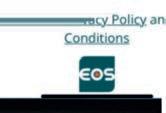







































































All eyes on DVS
Phase 2 of TfL’s Direct Vision Standard comes into force in October next year. MT gave operators the chance to have their say on how the proposals will affect them
TfL is due to introduce phase 2 of its Direct Vision Standard in October 2024 and its consultation on the amended standard closed on April 3. Just before the deadline Motor Transport, in association with Brigade Electronics, held a roundtable debate with TfL and a group of leading operators to discuss phase 2 and its expected impact.

Steve Hobson, editor, Motor Transport: Welcome to this roundtable in association with Brigade Electronics. We will start with short presentations from TfL, Brigade and DAF on the proposed revisions to the DVS.

Dr Polyvios Polyviou, strategy and planning manager

– freight, TfL: The DVS was introduced in October 2019 but enforcement was delayed until March 2021 due to Covid-19, and we made a commitment then to raise the minimum requirement from one star to three stars from October 2024 after consulting with industry.
Compliance has been good with 244,892 permits issued as of March 2023 and the average daily scheme compliance rate at 94%. We have seen a reduction in fatalities as a result – fatal collisions have halved since 2018 and serious injuries are down from 39 in 2018 to 17 in 2021.
Jacqui O’Donovan, MD, O’Donovan Waste Disposal: We have gone from 39 in 2018 to 17 in 2021 but the DVS only started in 2021 so the reduction wasn’t because of the DVS. Is that all HGVs?

Polyviou: Yes, those are for HGVs and this is showing the trend going down over the last few years. We feel
some part of the reduction was due to the DVS.
O’Donovan: Do we have the data on what star rating the vehicles involved were? I think that figure is distorting everybody’s view because while it has halved it isn’t because of DVS.
Polyviou: Yes, it’s a fair comment that the comparison goes beyond the DVS introduction in 2019 and there are more stats publicly available on our website for specifically the first year of operation. We have looked at accidents since enforcement began and they are still going down. Sam Weller, principal city planner, TfL: We are now monitoring the star rating of vehicles and whether the incident was vision-related so going forward we will have better visibility.
Polyviou: So why do we need phase 2? The original Safe System was developed in 2018/19 and it was our policy commitment to review and consult on it and increase the minimum direct vision rating to three stars. This aligns with the London mayor’s wider Vision Zero, which
DVS roundtable 22 MotorTransport 26.6.23
Dr Polyvious Polyviou, TfL
Jacqui O’Donovan, O’Donovan Waste Disposal Sam Weller, TfL
Photos: Nigel Spreadbury
is to have by 2041 zero deaths across the network.
There is more to do because zero-star vehicles accounted for four of the six fatalities in 2021 where vision was cited as a contributory factor by the police.
Based on our learned experience from phase 1 and improvements in technology we commissioned Loughborough University to undertake a review and provide recommendations to us, which we used to put forward our proposed Progressive Safe System. Chris Cooling, senior transport manager, Day Aggregates: Do we know what is the representation of zero star vehicles in the vehicle parc?
Polyviou: I would estimate that of the 250,000 vehicles with permits, around 60% would have zero stars.
You are all familiar with the existing Safe System [right], which has been applied to all zero-star vehicles and details are on the TfL website. The proposed Progressive Safe System will be applied to all zero-, oneand two-star vehicles.

Weller: The proposed Progressive Safe System will require either Class IV, V and VI mirrors or a mirrorreplacement camera monitoring system (CMS) or a combination of both.
The Class IV, V and VI mirrors are now pretty standard on most trucks to improve indirect vision but we have the CMS which are available on Mercedes and DAF trucks. So we are looking at accepting either the mirrors or CMS, which after talking to people are probably better than traditional mirrors because they remove the mirror arm and mirrors to get rid of that blind spot at roundabouts and there is also a benefit in that on articulation the camera will follow the trailer.
One change is that instead of saying CMS ‘should aim to’ eliminate the remaining vehicle blind spot at the nearside, the proposed regulation will say ‘must’. Another new paragraph defines ‘blind spot’ as ‘the area of the road that cannot be seen by looking forward through the windscreen or by using rear-view mirrors’.
Research by Dr Steve Summerskill at Loughborough University has shown that all those in red [below] cannot be seen directly from the cab. Clearly there is an issue there and we need to eliminate totally the blindspot down the side of the vehicle. At the moment some cameras do, some don’t.

Steve James, senior transport manager, FM Conway: I


find that diagram very misleading. That says the bikes in red are invisible to the driver. You are endorsing Class IV, V, and VI mirrors that enable him to see what is there. Weller: Moving on to side sensors, we have had some feedback on this already. On rigid vehicles the sensors ‘must ensure full coverage down the nearside of the vehicle’ and a lot of people have done this already which is really good. It is a recommendation at the moment but will become a requirement to cover the whole of the nearside for all vehicles, particularly the MG3 tippers where the driver is high up and has the blind-spot problem. For articulated vehicles the consultation says sensor systems ‘must ensure full coverage of the nearside of the tractor unit and in addition the semi-trailer’ and that sensors ‘must be suitably positioned to provide sufficient coverage but preventing activation solely on articulation of the trailer’. We have had a lot of feedback because a driver on a shift could potentially tow a couple of different trailers so what we are looking at doing – and this is only a maybe – is recommending something like radar or AI technology fitted to the tractor unit so it doesn’t matter what trailer you are towing. There is technology that fits on the mirror arm or cab that can cover the whole of the nearside of the vehicle without having to fit anything to the trailer. We are aware that drivers do trailer swaps and some trailers are not compatible because of the anti-roll system and ABS so this is something that will avoid connection difficulties. We’ll accept the manufacturers’ statement that it is compliant with UNECE reg 151 at face value.
James Ashford, head of UK connected services, Brigade Electronics: Previously you would need two separate sensor systems because the technology to combine them was not out there. As the trailer jack knifes as it turns, the sensors on the tractor are fitted so far back they pick up the trailer, which TfL wants to avoid. Our new Radar Predict will overcome this. It is due to be launched in the summer.
Carl Milton, cement logistics manager – UK, Cemex: One of the issues today is that we are on the cusp of newer technologies and some of what you are requiring is leadingedge technology. As an industry we need time to let manufacturers catch up. We first worked with Brigade back in 2001 developing side


MotorTransport 23 motortransport.co.uk 26.6.23
Chris Cooling, Day Aggregates
Steve James, FM Conway
James Ashford, Brigade Electronics
Carl Milton, Cemex ➜ 24
scan systems and that technology is quite aged now. Ultrasonics are giving way to radar, lidar and infrared. Weller: Moving on, this is new – a mandated moving off information system (MOIS). There have been accidents at pedestrian crossings where the driver has not seen a person directly in front of the cab. Even with a two-star rating there is a blind spot – I know you have the Class VI mirror but if for some reason he didn’t look in that, at least he will get an alarm.
It must be fitted in accordance with UNECE reg 159 and must be active not passive as with all the systems, so when you drive past a bin it doesn’t activate. That would drive the driver mad and then he will just ignore it after a while. We only want the warning to sound when there is a credible risk of collision.
Ian Hartley, vice president operation – network transport and Tradeteam secondary operations: How do we expect a driver to deal with this amount of information? This in itself can become a danger. I can think of certain junctions in London where you would end up not moving because there are that many proximity alarms triggering in your cab. What we are asking drivers to deal with in urban situations, which are difficult enough, should be part of the consideration here.
Weller: That is why we have gone from passive to active [sensors] because we don’t want constant ‘pinging’.
Hartley: The drivers are highly trained to look in their Class VI mirror and we are almost trying to remove their ability to be professional drivers: ‘I can’t move because that alarm has gone off even though I can see everything is alright’.
Weller: I have driven a truck through London so I know what it’s like. Sometimes you might not check your mirror before moving off for some reason and that is how fatalities can happen. This is a safeguard – I’m not questioning the drivers’ professionalism and I know what they go through. But this alarm is a failsafe that may just save a life.
Lee Anderson, transport and assets manager, Menzies Distribution: If the driver is going to ignore the mirror, why would they take notice of a proximity warning? Cooling: This device will appear in the GSR [the EU’s General Safety Regulations] in 2024 and the vehicle parc changes naturally. You asking the industry to retrofit all of this seems pretty flawed to me.
Mike Bennett, legislation engineer, DAF Trucks: One problem is that when we replace mirrors with a camera system you don’t get a Class VI mirror, you get a MOIS or an additional camera that takes away the need for it. The other problem is if you’ve read reg 159 it is not achievable by the aftermarket. That is regulation that covers homologation of new vehicles.
Milton: It is interacting with the other vehicle systems, so to retrofit things like interactive radar systems is inordinately difficult. Trying to bring it forward too quickly is in danger of hobbling the market. If this came in in London a lot of transport wouldn’t be able to run.

Garry Lewis, transport standards manager, Tarmac: If we are talking about retrofitting 165,000 vehicles in 16 months that is 10,000 a month.
Emily Hardy, UK marketing manager, Brigade Electronics: We are recommending in our consultation feedback that TfL looks at some of the systems out there being honoured for longer, because if people are putting vehicles on the road at the moment and fitting the equipment do they have to strip it off by October 2024 and replace it?
Natalie Chapman, head of public affairs, Logistics UK: It is really important that if businesses are making this investment that it is safe and effective and actually improves road safety, rather than contributing to driver distraction. Reviewing the Safe System and upping the standard is good in principle, but one thing I am concerned about is that we don’t know what proportion of sensor systems are passive rather than active, and therefore how many of the systems that are being fitted in good faith will have to be ripped out and replaced. Has that cost-benefit analysis been done on the impact it is going to have on industry? Lots of fleets have been fitting this kit even before DVS, whether that’s for FORS or just to do the right thing, and to say ‘sorry, your heart was in the right place but you have to rip it all out and replace it at huge additional cost’ sends the wrong message. Yes, up the standard, but do we confine it to new vehicles, so if you’ve already got systems fitted and have a permit can you continue to run it for the life of that vehicle because it is a significant investment?

Polyviou: We don’t know exactly how many active and passive systems there are out there and that is a question we are asking, but we have an indication from the operator survey we’ve shared that some of you have filled in for this work.
Lewis: The majority of the vehicles our hauliers are ordering now still have passive systems. Active systems aren’t part of our standard spec and hauliers are asking if the Volvo system will meet the requirements. We are saying ‘put money aside because it looks like it won’t meet the requirements’, yet this is OEM-fitted equipment that is better than a lot of the cheap aftermarket stuff on eBay. We are heading towards what could be a big mess if we aren’t careful.
Nigel Ponton, engineering manager, Cemex: Financially this could be an absolute horror show. You are talking about making it very difficult for people who are already struggling to make a living.



Hartley: Even for large operators like DHL Tradeteam this just makes everything on the shelves more expensive for the population of London. There is also a danger of fragmented schemes in different cities so we will end up with a fleet that is fit for London but not Birmingham or Manchester.
Lewis: One big thing that FORS managed to do was simplify the safety standards for trucks – before FORS, Tideway wanted this and Crossrail wanted that. We got that down to a single set of safety equipment and this is moving away from that ethos and defeating what FORS did. I am leading the GSAG group which is looking at FORS version 7 to try and bring these things into line, but it is a nightmare trying to get the wording right so we have a single standard that works for London and Glasgow or Inverness.
Polyviou: We have to strike a fine balance between adopting new safety technology and hearing all the concerns about cost. We are fully aware of the fine margins the industry is operating on.
Weller: We are also looking at the user experience when it comes to applying for permits, based on the feedback we have had from industry. We recognise there are a couple of issues and want to make the process easier.
Chapman: There are a couple of existing issues, one of which should have been in place when DVS first came in, which was a look-up tool. At the moment if any operator wants to find out if any one vehicle on their fleet has a permit and what star rating that vehicle is, they have to plough through their emails. What they want to do is type in the vehicle reg number and see if it has a permit and the star rating. Operators tell us that if in doubt they just put in another vehicle permit application.
The other issue is the upload time for DVLA data –operators are constantly bringing new vehicles into their fleets and if they have the minimum star rating or are fitted with a Safe System they shouldn’t be keep-

motortransport.co.uk DVS roundtable 24 MotorTransport 26.6.23
Natalie Chapman, Logistics UK
Lee Anderson, Menzies Distribution
Mike Bennett, DAF Trucks
Gary Lewis, Tarmac
Emily Hardy, Brigade Electronics
➜ 26
Nigel Ponton, Cemex




























































ing that vehicle off the road for a week or two because there is an admin issue. Perhaps there should be a period of grace to bring a new vehicle in as long as, if it is stopped, it has all the equipment fitted.
There just seems to be a lot of unnecessary admin and operators need to be given a bit more trust.
Richard Bimson, MD, Bimson Haulage: How much does TfL spend on direct vision? The reason I ask is that this is a two-sided debate. We are looking at it from a haulier and driver perspective and everybody wants to do everything we can to improve safety. What is the mayor spending to educate vulnerable road users about HGVs? Polyviou: A good point. We have a whole team working on VRUs and cycle safety and they do a lot with industry. They go out to schools and I can give you a list of examples.

Nick Simmons, CEO, RoadPeace: RoadPeace is a member-led charity for road crash victims and they campaign to make sure no one else goes through what they have been through. Education is an important part of that but getting the message across is difficult. People don’t think about this enough and don’t always engage in the conversation, but when they do it is incredibly powerful. TfL is playing a very responsible role here.
Hobson: I would now like to introduce James Ashford from Brigade Electronics to tell us more about what the proposed Progressive Safe System might look like. Ashford: The current Safe System requires proximity sensors, left turn camera, in-cab audible system and left turn audible alarm. Brigade classes all its sensor systems as active rather than passive because they give a warning to the driver and do not depend on the driver having to look at them. The proposed changes will involve quite a significant investment and while no one is in any doubt that the technology will be of benefit we have to balance the cost versus benefits. From 2024 the nearside camera must eliminate blind spots, active sensor systems must be fitted to semi-trailers, sensors on rigid vehicles must have a range of 2m and a MOIS must be fitted with a range of 2m in front of the vehicle.
On rigids the requirement will be that sensors do not pick up street furniture and that is something that was an issue with the old side detection systems.
We do have an AI-led side detection system that eliminates a lot of the issues put forward by TfL. It is always on if the vehicle is doing more than 20mph and can differentiate between static and moving objects. It will also intensify the audible and visual warnings to the driver as an object moves into the danger zone and a collision becomes increasingly likely.
On artics, sensors must ensure full coverage of the nearside of the tractor and the trailer with a range of 2m of lateral coverage. There are new technologies out there, including our Radar Predict launched in April, that can be fitted on the nearside of the tractor near the fuel tank and look down the whole length of the vehicle including trailers. Technology is coming on in leaps and bounds and installation time is around two hours as opposed to six to seven hours for a traditional side scan system.
There are areas of concern highlighted in our consultation response. The first is the GSR regs 151 and 159. TfL mentions a 2m range but reg 151 contradicts that and says 4.5m so that needs to be cleared up.
Hobson: Here’s Mike Bennett from DAF Trucks. Bennett: DAF Trucks is market leader in the UK with a share of 31%, which means we have the biggest pool of vehicles that require certification or equipment.

Since 2019 we have provided 25,000 individual certificates of star ratings as well as providing details of over another 150,000 vehicles via mass uploads to TfL. The problem there is that we supply that data as a VIN and a star rating which is what TfL has asked for. However, when you go to look for your vehicle on the system it will ask you for the vehicle registration number, which as a manufacturer we are not especially interested in.
Part of our request to TfL is that the look-up data is in line with the data it requests from us. Every vehicle is uploaded when we get a certificate of conformity but every day I get at least 20 enquiries saying ‘my vehicle is not on the system’. It is – but not under the registration mark so we end up doing twice as much work. We don’t want customers to wait eight weeks for the DVLA and TfL data to correlate so you can get your permit. So we have asked for a grace period of six to eight weeks so the data can correlate. TfL’s current online tool is not fit for purpose and needs a complete overhaul.
The New Generation DAF was introduced in 2021 with a view to both the GSR2 standards and the TfL DVS scheme. Most can meet three stars and some five stars. We have a UK-specific 4x2 tractor unit based on the XD that is the only vehicle in the industry that can achieve five stars without a low-entry cab.
The XG flagship truck can achieve two stars but will need additional equipment to meet the Progressive Safe System. As we move to GSR2 the vehicle will already have the necessary equipment fitted from the end of this year and we want to make sure GSR2 and the Progressive Safe System are aligned, because we do not want to be fitting even more equipment on top of the GSR2.
The LF too can only achieve two stars but we will start fitting the GSR2-compliant equipment from November this year. The UK DfT is somewhat behind in implementing EU rules into UK law so we don’t expect it to be at the same time, but we would like DVS to be in parallel with GSR2 as that is just common sense.
We estimate there are at least 211,000 vehicles with permits which will expire in October 2024, and every operator will have to reapply for a permit by showing the vehicle is rated at least three stars or has a Progressive Safe System fitted. It will be really difficult in 16 months.
What about cost? TfL’s own impact assessment puts the cost to operators at anywhere between £135m and £1.48bn, which is an unbelievable cost. There has to be some way of staggering the implementation process to enable the industry to support that level of cost. Nowhere in your impact assessment did you consider the effect on manufacturers, which was very short-sighted.
Polyviou: This was not a TfL impact assessment, it was done by an independent consultant commissioned by TfL and they were in touch with industry, and some of the people in this group have fed into this.
Bennett: There is a proposal to bring retrofit equipment within reg 151 but it is not in writing at the moment. The way the rules are written does not include retrofit components but that will be brought in, probably as an extension to the approval.
Hobson: Thank you to our presenters and to everyone for taking part in the debate. n

motortransport.co.uk DVS roundtable 26 MotorTransport 26.6.23
Richard Bimson, Bimson Haulage
Nick Simmons, RoadPeace
SYSTEM ERROR: Operators expressed concern about how the DVS admin and checking systems were not fit for purpose








Electric gritter from Econ Engineering
Econ Engineering has launched a new electric gritter truck designed for year-round operation.
The 19-tonne Volvo FE Electric 4x2, which is the first model in the Yorkshirebased company’s ‘Econ Zero’ range, features a range of demountable body options, allowing it to seamlessly switch between fleet roles while maintaining zerotailpipe emissions. This flexibility is possible due to Econ’s innovative Electric Quick Change Body (E-QCB) system. Developed in-house, the E-QCB utilises hydraulic rams to enable the vehicle to switch between demountable bodies in just 15 minutes, all controlled by a single operator. This system allows for the supply of different bodywork options, including a gritter body for winter maintenance, a tipper body for highway maintenance, or a cage tipper for refuse collection and recycling.
The truck was a close collaboration between Econ Engineering’s R&D team, product specialists from Volvo Trucks UK & Ireland, and supplying dealer Crossroads Truck & Bus.
Jonathan Lupton, MD at Econ Engineering, said: “The vehicle operates best in urban environments, where daily mileage is typically less than some longer distance motorway routes. As it is easy to switch body types with this model, customers can benefit from operating the vehicle all year-round. We are committed to evolving our Econ Zero range, and other renewable energy innovations, as the UK’s infrastructure develops in support of this.”
The FE Electric, which recharges in just 2.3 hours with a 150kW DC charger, has a range of 150 miles. It features two electric motors and a 2-speed gearbox.
Christian Coolsaet, MD of Volvo Trucks UK & Ireland, praised the collaboration, emphasising the importance of achieving net zero in all sectors, including winter maintenance.
Rapid success of New Generation truck illustrated by 50,000th delivery
DAF races to milestone
DAF has already produced 50,000 of its New Generation trucks since launch in 2021.
The DAF XF, XG and XG+ were the first trucks on the market to comply with the new European Masses & Dimensions regulations, and have been joined by the XD distribution model. The more aerodynamic shape and increased interior space has led to the fastest ever roll out of new vehicles in DAF’s 95-year history.
The 50,000th truck to be produced was a white DAF XG that was delivered to the Dutch customer Kleijn Transport in Alblasserdam. Kleijn operates a fleet of 220 trucks with more than half of them DAFs.

“Based on our excellent experience with the New Generation DAF vehicles, we are increasing their number to 50 now,” explained John Dekker, finance director at Kleijn Transport.
“We deliberately selected the spacious XG model to perfectly combine the highest fuel efficiency and best-in-class comfort, with the latter being hugely important given the current driver shortages.”
Speaking about the rapid success of the new models, Harald Seidel, president of DAF Trucks said: “Never before in our 95-year history has the impressive milestone of 50,000 trucks been reached so quickly after market launch.
“This illustrates the success of our New Generation DAF trucks. The milestone acknowledges the excellent characteristics of the vehicles and is also a reflection of the industry-leading quality our dedicated employees deliver to our customers every day.”
Partners reveal fridge-bodied electric truck
Mercedes-Benz Trucks UK has partnered with Solomon Commercials to launch its first fridge-bodied eActros electric truck.

The truck is based on a 4x2 eActros 300 and fitted with a Solomon Slipstream aerodynamic body to reduce drag and help maximise range. The body gets a tapered bulkhead, 3D roof deflector and sloping Kamm tail, while the refrigeration is controlled by a Carrier TRS Syberia over-cab chiller unit and Carrier Datacold temperature monitoring system.
The fridge-bodied eActros has a 1,500kg Dhollandia column tail lift, with a reversing camera integrated with the truck’s Multimedia Cockpit display screens.
Launched last year, the eActros is also available as a 6x2 chassis, with 27-tonne GVW and a body-and-payload allowance of 16.6 tonnes.
Mercedes-Benz Trucks head of future sustainability, James Venables, said: “The eActros is a truck for a new era, and by launching this refrigerated demonstrator,
we’re showing that it’s ready for real-life applications – anyone interested in trialling this exciting vehicle should contact their MercedesBenz Dealer as soon as possible.
“We’re here to support operators on the journey towards CO2-neutral transport too. All our dealers are fully qualified and eTruck-ready, while our team can provide advice and assistance on all aspects of electric truck operation, from charging infrastructure to a range of digital services to increase utilisation and optimise the total cost of ownership.”
Solomon Commercials MD Anthony Clegg added: “We’re proud to work with manufacturers such as Mercedes-Benz, helping customers transition to zeroemission transport. Adopting these vehicles is certainly picking up pace, particularly with the government wanting to reach stringent emissions targets and create clean-air cities. Electric vehicles will play an important role in ensuring this is achieved.”
Marketplace news 28 MotorTransport 26.6.23
Photo: Marieke van Grinsven
Photo: Tim Andrew
Scania explores power of megawatt charging system
Scania has successfully installed and tested a pilot megawatt charging system from ABB E-mobility as part of what it hopes will be a significant step towards high-power charging for heavy-duty vehicles.
The initial testing, to prove the technical viability of high-current charging, is a first important step towards the future megawatt charging system from ABB E-mobility. This will result in the progressive deployment of high-power chargers, starting from 1500A and eventually extending to the full megawatt charging of up to 3000A.
Megawatt charging technology is critical for long-haul electric trucks in order to allow the vehicle to recharge during a driver’s 45-minute break.
“We see a momentum for electric transport and our goal is that 50% of all vehicles we sell annually by 2030 are electric. To achieve this goal will require infrastructure and MCS is a crucial piece of the puzzle for the infrastructure going forward,” said Fredrik Allard, head of e-mobility at Scania.
Chris Nordh, global head of the fleet & transit business at ABB E-mobility added: “We are delighted to be collaborating with Scania on this milestone pilot, which will set a precedent for the sector and identifies one of the ways we collaboratively approach OEM charging
partnerships, effectively verticalising the technology stack to create great end-user experiences.
“Today is an exciting day and we look forward to many more milestones to come as we further develop a quality, reliable, and seamless charging experience for fleets.”
Greenhous grows with Bulkrite buy
DAF dealer Greenhous Group has acquired the property and assets of Shrewsbury-based commercial vehicle bodybuilder, Bulkrite.
Bulkrite is a specialist in the design and manufacture of large and small commercial vehicle bodies ranging from from 45’ livestock containers on tri-axle trailers down to dropside bodies on 1.5-tonne vehicles.
Completed on 2 May, the purchase of Bulkrite, which has been operating for more than 40 years, will increase Greenhous Group’s portfolio of products.
The acquisition represents a diversification and expansion of the Greenhous Group, which has 22 DAF locations across the UK.
Greenhous Group truck division MD Kevin Swinnerton, said: “This is an exciting addition to the Greenhous portfolio. The acquisition will enable us to expand our product offer and have greater control of our supply chain when it comes to offering our customers bodied DAF vehicles – all part of providing the highest levels of product and service to our customers.”
SuperTruck network rolled out across the country, allowing dealers to offer Pirelli-branded tyres
Prometeon tyres bound for UK
Prometeon Tyre Group has launched its new SuperTruck network to supply its tyres across the UK.
Having initially launched in Italy in 2019, SuperTruck is now rolling out to six other countries: Poland, Greece, Cyprus, Spain, Germany, and Switzerland.
SuperTruck UK gives dealers access to the supply of Pirellibranded tyres produced by Prometeon under licence, with the dealers getting training and technical support from the company.
India Gould, Prometeon’s marketing manager, said: “We hold the same end goal as our dealer network of offering a consistently high standard of service to truck fleet operators. The new dealer event was the ideal opportunity to get to know the dealers and explain the benefits that the Prometeon partnership offers their businesses.”
Ali Yilmaz, Prometeon UK MD, added: “It’s important that we work collaboratively with our tyre dealer partners to grow and develop the Prometeon market offer and at the same time continue to support all our dealers in growing their businesses through the supply of quality products and associated services tailored to the needs of truck fleet customers. SuperTruck will be a key component of our product and service growth and delivery plan as we move forward.”
Prometeon Tyre Group has also signed a new ‘pay-as-you-go’ contract with Collease Truck and Trailer Hire for their rental fleet based in Manchester, Felixstowe, Southampton, Norwich and Basildon.

A total of 1,920 units, consisting of 1,520 trailers and 400 vehicles, half of which are tractor units, will get their tyres replaced when required under the pay-as-you-go model.

Martin Drewery, maintenance director at Collease Truck and Trailer Hire, said: “We know from running a fleet for over 40 years that Prometeon’s Pirelli-branded tyres give us the ‘price against life’ value that we need for our fleet. Our customers need fuel efficiency, reliability and a premium tyre that is robust and hard wearing.”
Prometeon will be supplying tyres from their Itineris range. The majority of tyres fitted are IT-T90 for trailers, with IT-S90 being fitted to the steer and IT-D90 for drive axles.
“It’s been a positive move getting Prometeon on board, and a seamless transition from our previous supplier,” added Drewery.
MotorTransport 29 26.6.23 motortransport.co.uk
Photo: Karl Andre Smit
Until recently, the centre of the small Welsh border town of Knighton was home to a thriving Scania dealership, now an outpost of the Manchester-based West Pennine Trucks group.


But in the four decades since it was established, it had clearly far outgrown its original location. It was only the flexible approach of its loyal workforce that kept it functioning, as both the size of vehicles and the customer base increased significantly.
Now though, the dedicated team led by depot manager Phil Gillum can enjoy the fruits of years of patience in a spacious new dealership, with all the facilities that would be available to a high-profile big city dealership. Most welcome of all though, is space. No longer will Gillum have to get in early on a Saturday to shuffle trucks for the busy day ahead.
Long and winding road
The story of Scania in Knighton dates back to 1984, when Knighton Trucks was established. Its first sales were a pair of tractors to the late Graham Middleton, a livestock haulier from Llandrindod Wells.
From small beginnings, the business thrived, and in January 2000 became part of the West Pennine Trucks network, by which time Gillum already had 11 years of service with the company, having joined as a mechanic.
The customer list reads like a Who’s Who of mid-Wales hauliers, including Bayliss Bros, AE Gough & Sons, Phil Morris, Craig Morris, Connop & Son, Alick Archer & Sons, Bromfield Sand Gravel and Glyn Hamer Mill Mix all having been customers for more than 20 years, with John Weaver and Pete Preston dating back to before 1990. The cramped town centre location didn’t stop Knighton ending 2022 with the highest customer satisfaction score in the West Pennine Trucks network, scoring 8.6 out of 10, as well as finishing fourth in the Scania Service Team Awards.
Powys to the people
Manchester-based Scania dealer West Pennine Trucks has invested big in its long-established Welsh outpost

All mod cons
The new site is on the Ludlow Road industrial estate on the outskirts of the town, and covers 1,400sq m. The customer-facing area pays considerable attention to driver comfort, even to the extent of providing a bed for comfortable resting. The back-office functions include an office for sales executive Richard Barnes, a dedicated training room and an archive of manuals for every Scania built.
The parts department keeps a large inventory of commonly needed spares, backed up by an overnight VOR delivery from the central UK warehouse and Hinckley, and stock items within four days from Belgium.
The pride of the new depot, though, is the workshop. Four bays include two at 23m long, enough for the longest hay and straw drawbar combination, and another at 18m. The end bay is dedicated to tacho calibration, with its own office. Gillum explains that the demand isn’t sufficient to host an ATF lane, with a couple of independent facilities within relatively easy reach. The new workshop is as energy efficient as possible, making
Marketplace feature 30 MotorTransport 26.6.23
HOSTING A LIFESAVER
Among the display of Scania trucks at the launch open-day was one vehicle which looked a bit out of place.
A full-size SLARS lifeboat launching tractor is not what you’d expect to find 50 miles from the nearest sea, but the tractors are actually built next door by the UK’s least well known and probably most exclusive automotive manufacturer, the Royal National Lifeboat Institution.
When the previous manufacturer, Clayton Engineering, decided to sell up, the RNLI took the unprecedented step of acquiring the operation. If you still can’t see more than a neighbourly link to WPT, the £1.5m tractors, built at the rate of two per year, are powered by 13-litre 400hp Scania engines, and where better to have their PDIs and any updates carried out than on the other side of the fence? The 37-tonne vehicles can launch a 18-tonne Shannon Class lifeboat in up to 2.4m of water, but can survive submersion in up to 9m if things go wrong.

WEST PENINE TRUCKS
West Pennine Trucks is one of six independent dealers across the Scania network and has held the Scania franchise since 1986. It is the North West’s largest privately owned, authorised Scania dealer and covers the developing industrial area of Greater Manchester, down into the more rural counties of Cheshire, Staffordshire, Shropshire and mid-Wales.



The West Pennine Trucks team provide the complete sales and aftersales support package and work side by side with some of the most recognisable brands in the UK. It operates at eight locations across its region, in Middleton, Trafford Park, Stoke on Trent, Telford, Oswestry and Knighton, with VMUs in Whitchurch and Heywood.
good use of natural light and with features such as motionsensing LED lighting.
Looking to grow
While the current team numbers 15, Gillum would like that to be higher. His life would be much easier with another two mechanics/technicians. Anyone with an interest in automotive, transport or logistics or with relevant experience can register their interest by e-mailing contactWPT@scania.com or by dropping their CV in to the dealership.
At the new depot’s official opening day, which featured a selection of Scania trucks, old and new, West Pennine Trucks’ MD Steve Howard said, “We’d outgrown our previous location and I’m delighted to be able to commit to the transport and logistics community of mid-Wales by providing them with a depot fit for the future. Our team at Knighton takes immense pride in delivering excellent customer service and I’m confident that our move will further enhance our offering.” n
MotorTransport 31 motortransport.co.uk 26.6.23

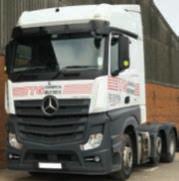

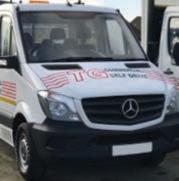
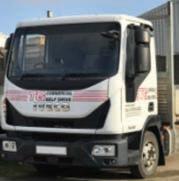
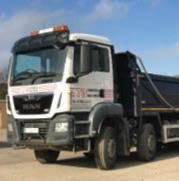
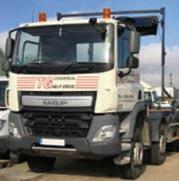

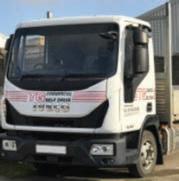

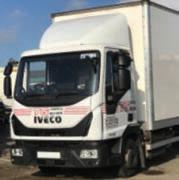
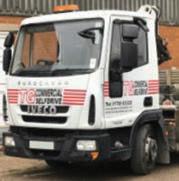

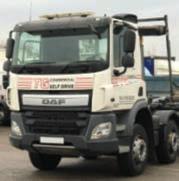
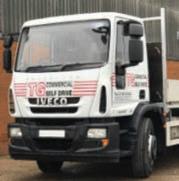













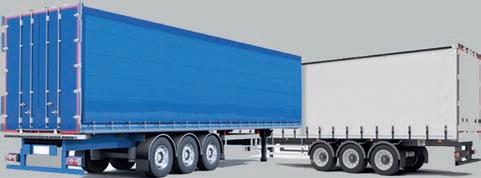






















































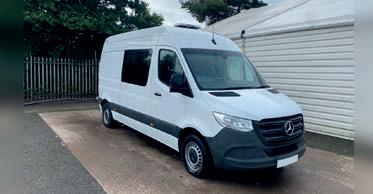




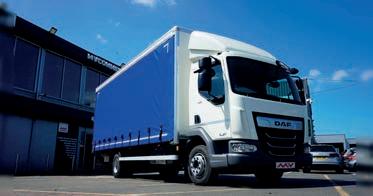
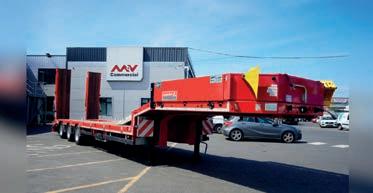



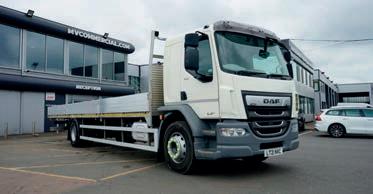















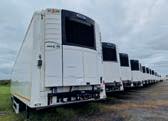

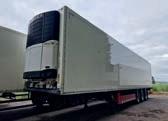
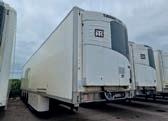
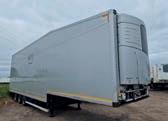

Best Use of Technology Award
Partnered with
JM Clark
JM Clark’s AIOne solution provides real-time visibility into operations, enabling better decision making and streamlining of business processes. The AI-based route optimisation algorithms allowed the business to reduce the time spent on route planning, invoicing turnaround time and paper-based processes.
The platform’s cost effectiveness has helped improve their bottom line, and reduce environmental impact. Created with Omnia Smart Technologies, AIOne has addressed operational challenges such as manual processes, allowing the company to improve its cashflow by invoicing promptly and reducing costs through better route planning.
JM Clark implemented the technology because of its comprehensive planning and scheduling tool; driver app; electronic proof of delivery; and its digital job and customer management. The business now has full visibility and control of live and historic data.
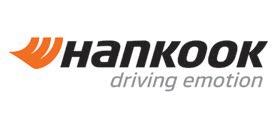
“Using tailor-made technology to overcome problems, reduce costs and step away from manual processes is first-rate,” said judges.

Palletways
Initially born from the operational need to capture and harness accurate data on individual pallets instantly and on the go, Palletways ID is the result of two years of research and development to deliver greater real-time visibility and information on health and safety for staff and customers.
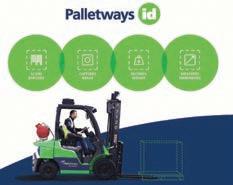
Palletways ID has developed the world’s most sophisticated forklift truck-mounted sensor technology that combines four key data collection elements, with imaging, barcode scanning, weight measurement and cubing/dimension measurement in one, while the forklift is in motion. Sensors capture the weight and measure each pallet’s side and height for cubing and automatically store the data. Palletways ID has successfully flagged more than 7,000 pallets weighing over 1 tonne, a significant boost to health and safety. The system also flags any discrepancies on size or weight.
“A great efficiency improvement with clear health and safety benefits,” said judges. “A great combination of technologies being used to improve accuracy and decision making.”
Prohire


Prohire launched an in-house division called ProGreen to support its operations and help the firm move into alternatively fuelled vehicles. After working closely with their client, Wiltshire Farm Foods, ProGreen decided to develop a 100% electric temperature-controlled van.
Turning to suppliers CoolKit, GAH, Geotab and Trailar, the electric fridge van, capable of reaching temperatures as low as -18C, was built
on a Maxus eDeliver 3 platform returning a 150-mile range and 600kg payload. It is capable of making around 60 delivery drop offs per day and, based on a normal mileage of 20,000 miles per year, is estimated to save 5 tonnes of CO2
ProGreen and Wiltshire Farm Foods have full visibility of the electric van’s performance thanks to its telematics system. Importantly, Prohire’s ProGreen division is about “more than just acquiring vehicles,” and aims to support businesses as they transition to alternative fuels.
“ProGreen has made a great leap forward on the journey to electric vehicles,” said judges.
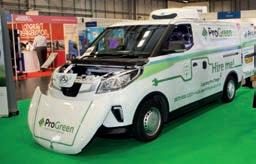
Stobart
Communication issues made apparent during the pandemic led Stobart to better engage with its drivers, improving their access to important tools and information through the creation of a bespoke app.
The ESL Connect App has been developed in partnership with Enterprise and supports the operational delivery of Stobart’s network. The app has enabled the business to plan in real time thanks to the reporting of driver absence, holiday bookings, shift swaps, and other planning matters. Drivers are also able to report wage queries 24/7 and can receive important notifications.

“So many processes and functions have been combined. Although the app is nothing new, the rollout and functionality shows how Stobart is utilising technology to improve the business efficiency,” said judges.

Vantec
Autonomous HGVs have been widely discussed for several years but working examples of the technology are few and far between. Vantec, however, can lay claim to having not only developed a proof of concept, but made the project operational.

Their V-CAL (Vehicle Connected Automated Logistics) 5G Automated Logistics project created a network on a 500m private road between Nissan Motor Manufacturing UK’s (NMUK) site and Vantec’s Turbine Business Park site and deployed a self-driving EV truck that delivered parts to NMUK autonomously using a remote control teleport rig.
The next stage of this project aims to create a safe, autonomous supply chain as well as contribute to decarbonisation and will move from one self-driving HGV to three, in which one tele operator will monitor and control remotely to transport product to NMUK. Judges said: “A company with an eye on the future making a contribution towards decarbonisation.”
26.6.23 40 MotorTransport
MT Awards 2023 shortlists





Business Excellence Award

Partnered with
ABE
ABE in Ledbury is a business that has stood the test of time. Its commitment to delivering excellence is clearly demonstrated across the operation, contributing to the company’s performance and raising the bar for the sector.

ABE continually assesses core areas of business along with its customers and the local area to research potential growth opportunities. This has led to a closer customer relationship, helping clients grow alongside ABE’s own development. The company credits its consistent performance to strong housekeeping efforts, enabling it to adopt a programme of investment, in turn creating a robust and sustainable operation.

“CSR and staff development is very good as well as the charity work that MD Clive Brooks has completed recently,” one of our judges said. “Turnover wasn’t too impacted by Covid and has generated a generous dividend to shareholders.”
Minclipper Logistics
Miniclipper Logistics is a flourishing 3PL offering tailored warehousing and distribution solutions for over 200 customers in the central Bedfordshire, Buckinghamshire, Hertfordshire and Staffordshire regions.
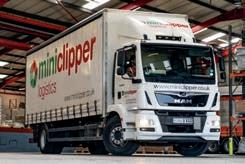
Starting with one man and a van back in 1971, it has matured into a successful SME with almost 200 employees and is now one of central Bedfordshire’s leading privately owned companies.
Miniclipper operates a 24-hour distribution centre from Dunstable and six warehouses with over 500,000sq ft of racked storage space for palletised goods and fulfilment services. It has over 50 vehicles in its delivery fleet, which range from 7.5-tonne rigid vehicles to double decker trailers for deliveries throughout the UK via its membership with three leading pallet networks – Palletline, UPN and The Hazchem Network.
“What a success story,” said one of our judges. “A great business that ticked every box.”
Palletforce
Palletforce can boast 20 years of profitable business, sustained growth, technological innovations and an extensive network of over 120 members delivering to over 15,000 SME customers every day.
The firm delivered unwavering support to members during Covid and
Brexit and bounced back to continually break volume records. During 2022, when the entire industry faced labour and cost challenges, swift and decisive action from its directors delivered the changes needed to secure service and business excellence across the network.
Palletforce’s business model and agility to make swift decisions has allowed it to be highly profitable and cash-generative. It is asset light, has a very conservative balance sheet, most debts are offset and it has more than adequate provision for employee pensions.


“Financially the company is doing well,” one judge commented. “They’ve shown agile reactions to increased costs and driver shortages.”
Stephen Sanderson Transport
As a family business celebrating its 50th year, Stephen Sanderson Transport says it has faced that most difficult challenge – taking business to the next level. Having experienced rapid growth and change, it has assessed how it continues to upscale its operations and innovate without compromising on the values that differentiate it.
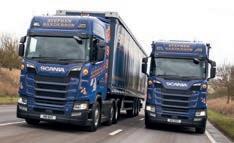
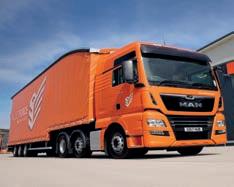
The answer, it says, is in its people and processes. By helping staff to feel part of its journey, investing in training, welfare and new facilities, it has enjoyed what it describes as unprecedented engagement levels. By reviewing its entire operation, the firm has seen an uplift in quality, performance and agility.
“Excellent results from staff surveys and how these are benchmarked against performance,” said one judge. “The business also explains how it monitors corporate strategy in terms of emissions and carbon footprint. Investment in new facilities will help fuel growth.”
Willmotts Transport
A strategy of sustained growth over recent years has driven Willmotts Transport’s rapid development from a small family business into one of the South West’s leading BRCGS Certified warehousing and distribution companies, now employing close to 200 people.

Part of the Stotts Group, Willmotts’ core business is the operation of eight food-quality warehouses and a fleet of 150+ vehicles providing services from its Somerset site to over 300 active accounts.
Customers range from local manufacturers to national and international prestige brands and the company is winning significant new business.
“Willmotts’ profits and turnover are excellent and they have invested well in facilities, new vehicles and trailers,” said one judge. “There is evidence of a long-term customer base and how the business has provided solutions to issues it has faced. It also has very good apprenticeship and staff development schemes.”
42 MotorTransport 26.6.23
MT Awards 2023 shortlists


MT Awards 2023 shortlists

Clean Fleet Van of the Year
Partnered with



Ford Pro E-Transit
There is no doubt that the Ford E-Transit has grasped the baton from the diesel Transit and is making serious headway in an expanding market for large electric vans. Offering a near-200-mile WLTP range with uncompromised payload and an extensive list of standard equipment and safety features, the E-Transit has found a home on many large fleets.
Unlike much of the competition, the E-Transit is available with two power outputs offering 430Nm of torque and a choice of 135kW or 198kW.
Payload is up to 1,758kg on panel vans but there’s an extensive range of variants with double-cab-in-van and chassis cab bodies. Vans are available in multiple lengths and roof heights, as well as with GVW from 3.5 to 4.25 tonnes. Features including Ford’s ProPower Onboard system, which can deliver up to 2.3kW in the cab and load area to power conversions and equipment while out at work, have helped broaden its appeal with an offering diesel vans cannot match.
“Ford has created a solution to meet the needs of the customer with an attractive offer in terms of retail and fleet customers. They are making the transition from diesel to electric seemless,” said judges.
Iveco eDaily
The Iveco eDaily van is the latest in a long line of electric Iveco vans dating back more than a decade.
Visually the same as the diesel van with the exception of its front grille, where the charging points are located, the zero-emission Iveco eDaily is available at up to 7.2 tonnes
GVW enabling a 4.6-tonne payload and 3.5-tonne towing capability – the widest range of any electric light commercial vehicle on sale.
Panel vans have a load volume of up to 20cu m and there are crew cab, chassis van and minibus body variants as well as single-wheel and twin-wheel versions. Underlining its versatility, there’s also alternative rear axle ratios on the 50C and 72C versions – something no other manufacturer is offering.
The radical approach to battery sizes, with modular, removable batteries is also unique and gives operators a choice of three different battery options, each using a 37kWh module. The eDaily can have 37kWh, 74kWh or 111kWh batteries fitted, enough for up to 186 miles.
“Iveco has produced a van with a wide range, suitable for many operators. It also has a decent range and gives customers of all types the ability to go electric,” judges said.
Maxus eDeliver 9
Chinese manufacturer Maxus has been making waves as a real disruptor in the light commercial vehicle market. Its range of electric vehicles has caught the attention of many blue-chip companies. This success is partly down to its large van, the eDeliver 9, being the first van with a useable real-world range in excess of 200 miles while also offering a range of bodies and batteries. Like its smaller sibling, the E Deliver 3, the E Deliver 9 offers the prospect of decent range with high levels of equipment in a modern van at a reasonable price.
The E Deliver 9 has a 150kW (201bhp) motor that develops 310Nm of peak torque and is paired to a choice of three batteries with 52kWh, 72kWh and 89kWh options. Although not available at a 4.25-tonne gross vehicle weight, the 3.5-tonne van still manages an impressive 1,200kg maximum payload with the smallest 52kWh battery, while the biggest 89kWh battery still has capacity for 860kg.

Judges said: “The actions of Maxus may have prompted legacy OEMs to pull their finger out with electrification, but the eDeliver 9 is a lot more than just a disruptor.”
Vauxhall Vivaro Electric
The Vauxhall Vivaro Electric has become the go-to choice for some of the UK’s largest fleet operators as well as for a growing number of SMEs looking for affordable and practical zero-emission vans. It offers fleets all the benefits of a zero-emission powertrain with no compromise in capability.
The breadth of businesses and fleets choosing the Vivaro Electric is a testament to the van’s affordability, practicality and efficiency, as well as its range. Available with a choice of two battery options, the Vivaro Electric offers an option for a wide range of operators with a 50kWh battery for urban and city areas or a larger 75kWh battery more suited to out-of-town work.
A WLTP range of up to 205 miles from a single charge is supported by the ability to rapid charge at 100kW, taking just 30 minutes for a 0-80% charge on 50kWh variants and 45 minutes for 75kWh variants. The vans can be specified in either standard or long lengths with a load capacity of up to 6.6cu m. The 50kWh variants can achieve a maximum payload of up to 1,226kg.
“The wide range of fleets to have adopted the Vivaro Electric speaks volumes about the ability and appeal of the Vauxhall electric vans,” judges noted.



44 MotorTransport 26.6.23




















































MT Awards 2023 shortlists

Customer Care Award
Browns Distribution Services

Browns Distribution offers comprehensive solutions across every facet of the distribution supply chain. Its forward-thinking team has been pushing the boundaries of road haulage and pallet distribution since 1955. Embracing change, Browns values the direct impact that adaptability and evolving with the ever-changing industry landscape has on customer service. Providing exceptional customer service is a fundamental principle of the firm’s business character, supported by continual investment in people, technology and innovative approaches to challenge resolution.
Our judges said: “Customer care is clearly driven from a top-down approach. An in-house development team with custom-built tracking and portal and app demonstrates how their tech investments support customer experience and care.”
DFDS Logistics
DFDS Logistics has overcome major challenges to achieve exceptional growth driven by a commitment to outstanding service. Elevating customers to the status of partners, and going the extra mile to exceed their expectations, is engrained at every level of the business.
Initiatives include forming a business partnering and projects team, increasing interaction with customer partners and tailoring KPIs for each partner. Outcomes have surpassed targets with customer satisfaction at record highs and a 37% increase in NPS.
Our judges said: “This entry demonstrates clear business goals and objectives with strong senior executive involvement. DFDS is seeing significant improvements in their metrics by introducing improvements including a dedicated project team and dashboard.”
DPD UK
In 2022 DPD once again delivered industry-leading service quality and high levels of choice and convenience to the UK’s home shoppers, resulting in exceptional customer loyalty, a world-class NPS of 76 and another year of excellent financial results.
Innovations to the shipper and shopper experience included an extension to hub sortation hours and the introduction of zero-emission home delivery robots to the fleet.
Our judges said: “A different
Partnered with


class to most companies. You have to not only consider the levels of customer satisfaction but also the scale of the business that is achieving them.
“A sense that customer care sits on the senior leadership agenda and numerous initiatives including more flexible delivery windows, more time, an app for driver ratings and suggestions, all reflected in high NPS and Trustpilot scores.”
Speedy Freight
Customers are the bedrock that Speedy Freight’s business revolves around. Its services are designed to provide simple, high quality and efficient logistics solutions that put the customer first. The company offers a problem-solving service to customers which is entirely bespoke around their individual requirements. This has produced an exemplary NPS of 90 which places Speedy far and above the industry standard, and a 5-star Trustpilot rating.
Our judges said: “Speedy has an outstanding Trustpilot rating - the highest seen in all the entries - and clearly does what it does very well. A wide range of flexible models of delivery and options to support customers’ needs, focused on making the customer experience a positive one. The company prides itself on providing the feeling of a local service even though it is moving goods nationally and internationally.”
Walkers Transport
It was imperative that Walkers Transport continued to deliver superior service levels to its customers during 2022, while resisting macroeconomic challenges and navigating resource shortages to ensure its customers were shielded from any impact.




The company was “hyper-focused” on the retention of higher margin, loyal customer accounts and let go of lower margin work in order to do so. This approach allowed Walkers Transport to protect key accounts at times of industry instability and embed itself into their operations as an indispensable, long-term strategic partner.
Our judges said: “A really strong entry from a very professional company, illustrating how customers can monitor progress through the portal, reviews and account teams. Livery for customers’ customers as an example of delighting the customer was also a nice touch.”
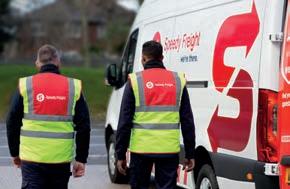
26.6.23 46 MotorTransport













MT Awards 2023 shortlists

Fleet Truck of the Year
DAF XD
For 2023 DAF Trucks put forward its XD range, the latest model in its New Generation line-up, rather than the multiple Fleet Truck of the Year winner, the XF.
The development of the XD was focused on safety, efficiency and driver comfort. While not a direct replacement for the long-running CF, the XD is aimed at the distribution sector, though with a range of cab options including a high-roof sleeper and an MX11 engine rated up to 450hp it can also handle long-distance tramping.
Launched in September 2022, it is 17cm lower than the XF and can score up to five stars under the London DVS. The XD is fitted with a corner-view camera as standard and operators have the choice of conventional mirrors or the mirrorless DAF digital vision system. DAF is fitting all the extra safety equipment that will be required in July 2024 under the EU General Safety Regulations 2 to all new vehicles from December 2023.

The XD includes a range of safety features to protect the driver including its patented programmed cab displacement system, which allows the cab to move back 40cm in the event of a front-end collision. Improved aerodynamics and drivelines contribute towards a 10% fuel saving compared with the CF.
MAN TGX
MAN Truck and Bus UK chose the latest TG3 version of its TGX tractor first launched in 2020, which represents MAN’s four “pillars of excellence”: Excellent driver fit; great efficiency and economy; optimised uptime; and strong partnerships.

The 2023 TGX can be specified with MAN’s new OptiView mirror replacement system and the 2.5m-wide sleeper cab has three height options, including the flagship high-roof GX and 90-degree opening doors. The cab is fitted with a digital instrument cluster that displays a wide range of intelligent driver assistance systems, all controlled by the MAN SmartSelect touch pad.
The latest D26 engine comes with three ratings up to 520hp and, together with other improvements to the vehicle, gives up to a 6% fuel saving over the previous version. Based on a TGX 26.480 6x2 doing 150,000kms a year over three years with an R&M contract, MAN calculates that the TCO works out at 47.7ppk.
MAN’s 67 UK service locations are a mix of OEM and privately owned and many operate 24/7, as does MAN’s Mobile24 breakdown service. All new customers deal direct with the OEM for sales and R&M contracts.
Partnered with


Renault Trucks T480
The Renault Trucks T was launched in 2014 and the latest T480 features the fuel-efficient 483hp DE13 turbo compound engines introduced in 2022 that can help cut fuel consumption by up to 10%.

The cab has also benefited from refreshed interior and exterior design, which helped Renault increase sales by 18% in 2022, almost double the market rate of growth.
With up to 2,700Nm of torque available from 900rpm, Renault has developed SmartTorque Control which, when coupled with Optivision cruise control, applies just the right amount of torque to maximise efficiency and performance.
Most of the 74 dealer locations across the UK and Ireland are privately owned, with Scotland and the east and west of England covered by Renault Trucks’ in-house dealerships. Dealers are supported by parts deliveries from warehouses in Rugby and Lyon, with first time pick rates of 92% and 99% by 10am the next day.
Volvo FM
The Volvo FM has been around for 25 years in various incarnations and is looking to the future with alternative drivelines including LNG, battery electric and hydrogen.

Today the FM and FMX ranges represent 30% of Volvo’s UK sales and, with a wide range of engine and cab options, is the OEM’s most flexible vehicle. Engines range from 330hp 11-litre to 500hp 13-litre diesels, plus 420hp to 500hp LNG versions. The 13-litre 460hp engine was the most popular powerplant in 2022; last year 9% of sales were LNG and 0.2% were battery electric.
There are three interior trim levels and six cab designs available, with the top of the range Globetrotter the most popular among UK buyers. The FM13 with a lightweight pusher axle weighs in at just 7.5 tonnes with 400 litres of fuel, giving a payload capacity of up to 36.5 tonnes.
The cab interior has been improved after feedback from drivers, with easier access, a new digital dash display and 50% more storage space. The FM comes with a wide range of passive and active driver assist systems, including a left corner camera, and can achieve three stars under London’s DVS. Volvo is already compliant with the General Safety Regulations 2 and has just launched a built-in side detection system to warn of objects down both sides of the vehicle.
26.6.23 48 MotorTransport































MT Awards 2023 shortlists

Haulier of the Year

Partnered with
Boughey Distribution


Boughey Distribution has enjoyed a dynamic year which has included a strong financial performance, the launch of a series of colleague welfare initiatives and a commitment to applying for B Corp certification.
Boughey operates 140 vehicles and 250 trailers, and manages 1.1 million sq ft of ambient warehousing at its sites in Nantwich and Crewe. With particular expertise in the ambient grocery sector, the company provides storage, distribution and specialist valued-added services to the food industry including consolidation, e-fulfilment and contract packing.
Our judges said: “Impressive improvement in profitability together with a commitment to the environment with the experiment with electric trucks.
“A strong commitment to environmental goals and employee engagement, Boughey is clearly a business with high standards.”
Browns Distribution Services
Browns Distribution offers comprehensive solutions across every facet of the distribution supply chain. Browns’ forward-thinking team has been pushing the boundaries of road haulage and pallet distribution since 1955. Welcoming of change and embracing of technology, Browns consistently strives to improve and evolve with the ever-changing industry landscape.
Our judges said: “Impressive growth in profitability and an innovative approach to driver recruitment and retention. A good well-run business at the start of a threeyear journey. Favourable customer testimonials from a varied range of clients and product types state reliability, accountability and care with a personal touch.”
Goldstar
Goldstar is celebrating its 25th anniversary in 2023, growing from a modest courier service to become one of the most prominent operators in the commercial airfreight transport sector.
Throughout this growth, the business has retained its core values and operates on a partnership approach with its customers and team members. This has been at the heart of its financial success.
Our judges said: “An outstanding example of adaptability and resilience over the last three years. With the collapse of the airfreight sector Goldstar was able to deliver a 65% increase in turnover and 163% increase in profitability over three years through the development of new customer relationships. In addition it achieved an amazing 10% reduction in CO2 emissions.”
Stephen Sanderson Transport

Thanks to a forward-thinking strategy and willingness to diversify, Stephen Sanderson Transport has thrived during recent times of unprecedented instability.
Attaining BRCGS AA accreditation has provided access to the food and drinks distribution sector, and has created a positive impact across the whole business. Sanderson’s entire transport operation has moved to a new, state-of the-art site, enhancing its fully integrated customer offering and improving staff welfare.
Our judges said: “A new site coupled with maintenance of high service levels produced above average profitability. [This is] a family-orientated business that gives great service and recognises its responsibility in the community. It has the desire to be here in years to come, a sound financial case and continually invests in the future.”
Walkers Transport
Macroeconomic disruptions continued to amplify pressure across the haulage market during 2022 as demand from end consumers on delivery increased disproportionately to available resources.

Walkers’ long-standing strategy in serving a highly diversified customer base and premium service positioning provided operational resilience against the impact of industry pressures, and in particular, the e-commerce boom.
Its highly developed operational IT capabilities, combined with its 17-strong team of professional customer service advisors, ensure Walkers provides superior service.
Our judges said: “Positive testimonials giving a strong indication of excellent customer service. Strong commercial strategies in place to embrace the challenges in the future and maintain customer relationships.”
Wilmotts Transport
Willmotts Transport, part of the Stotts Group, has grown substantially in recent years and is now seen as a premier BRCGS-certified warehousing and distribution business in the South West.
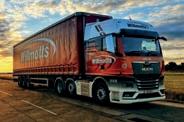

Despite difficult trading conditions, Willmotts has driven consistently high performance in growth, investment and customer service across every area of its operations, developing a portfolio of transport solutions.
Our judges said: “Significant improvement in turnover and profitability in a turbulent and complex market sector. A proactive response to the driver shortage together with continued investment in staff welfare. A good haulier in all aspects.
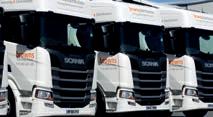
“Positive customer testimonials evidencing personal relationships.Working with external partners to build a workable path to carbon net zero and clear working practices to reduce environmental impact. Exceptional financial performance year on year and a very clear focus on safety and compliance.”
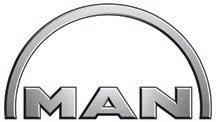
26.6.23 50 MotorTransport













MT Awards 2023 shortlists

Home Delivery Operator of the Year
Partnered with
BJS
Named after Baba Jaswant Singh Ji, the family-run and independent two-man home delivery company BJS has created a delivery business with extremely high standards, using a customer service-led approach supported by its IT systems.
Working closely with its partners, BJS has used its experience in the retail, transport and IT industries, applying automation where possible and excelling in customer care. Its warehouse technology gives it total oversight of the storage, picking and dispatching of products through its network, while its IT systems allow APIs to be linked to customer systems to give them the data that they need. The bespoke software allows for route planning, order tracking, proof of delivery and warehouse management, and is said to be what powers the whole customer journey.
A full-size training site off the M6 helps to train staff on real-life situations and as a result the firm has a 99% on-time and in-full delivery rate, with a damage rate of less than 1% and a loss rate of less than 0.1%.
“BJS epitomises a compassionate business that is clearly embracing technology to improve health and safety as well as driver performance,” said our judges.
DPD
The strengths and reputation of DPD continue to grow as the parcel carrier increases its network and volumes with new and existing clients. Customer satisfaction continues to improve and so does loyalty, with 70% of the top 100 customers having now been with DPD for more than five years. Several high-profile customers have also renewed contracts and the company has seen a significant growth in new business.
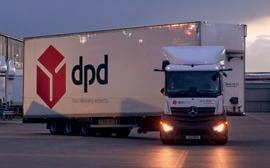
A world-class Net Promoter Score of 76, as well as a commitment to improve upon its ‘TNTs’(tiny noticeable things), has seen DPD advance many facets of its business, from hub sortation to improving first-time delivery rates with a new pinpoint address function.


Innovations to the shipper and shopper experience have included the introduction of zero-emission home-delivery robots to the fleet in Milton Keynes, with 1,500 successful deliveries made during a six-month trial.
There have also been improvements to health and safety, focused on training 1,500 managers in mental health awareness, to create a culture where DPD people feel safe to talk about their emotional wellbeing.
Judges remarked: “DPD’s innovative initiatives, including the robot deliveries, show a commitment to evolving and improving as it copes with rising volumes and the greater need for fleet efficiency.”
Packfleet
Packfleet is on a mission to solve more parcel deliveries. Established in 2021, it is a net-positive delivery company, operating a fleet of 50 electric vehicles and planting trees for each delivery.

While many companies strive to be carbon neutral, Packfleet is undergoing internal and external audits to ensure it offsets its impact and, together with the help of its co-founders – formerly of banking disrupters Monzo – has built routing algorithms to improve efficiencies and give customers an accurate picture of where their parcels are at any time.
Even their iridescent turquoise livery has an environmental reason behind it – to ensure vans stand out but do not lose their impact over time as the design fades. The company strives for no missed deliveries to cut wasted mileage, and has a parcel failure rate of just 0.1% thanks to accurate delivery times.
A reverse packing collection service allows customers to recycle packaging when Packfleet returns for another delivery.

Judges said: “The concept of a new disruptive all-electric operator is brilliant. The reverse logistics offering is great example that others should follow to help recyle, and improve their green credentials.”
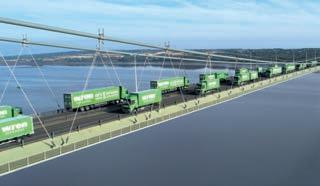
Wren
The UK’s number one kitchen retailer has a formidable two-person delivery fleet operating across the UK, but is always striving to make improvements in its delivery chain.

Impressive year-on-year growth figures – with 13 consecutive years of increased sales – mean Wren made 16.3% more deliveries last year, a total of more than 2,500 kitchens per week. Success is about continuous improvement and owning the supply chain, which is why the company makes, sells and delivers. Wren insists its delivery service is about relentlessly scrutinising the time, service and information-critical sector to identify its own and others’ weaknesses in order to find opportunities to improve.
From an increase in mental health first aiders to a decrease in road traffic incidents, Wren is on the ball with its operations. Whether it’s a preventative maintenance programme, travelling fewer road miles or its 97% on-time and in-full delivery rate, Wren continues to improve.
Judges said: “Wren’s growth and performance is nothing short of staggering, and so too is its health and safety record and the lengths it goes to to improve employee wellbeing.”
26.6.23 52 MotorTransport

MT Awards 2023 shortlists

Innovation Award
Partnered with

Brigade Electronics


Brigade believes its Radar Predict product is one of the most technically sophisticated in its portfolio and will identify the behaviour of the vehicle as well as the VRU.
It has been developed as a highly accurate collision detection system using artificial intelligence (AI) to determine potential collisions and warn the driver with sufficient time for an intervention.
Radar Predict can detect VRUs up to 5m from the side of the vehicle, 7m in front and up to 30m to the rear of the cabin.
The product constantly gathers object detection data such as the speed, direction, acceleration, and turning rate of a vehicle. This data is then put through a processor created by Brigade technology partners to calculate the point of collision with VRUs alongside the vehicle and warns the driver of any risks through a visual display teamed with audible warnings.
“This is a great product and a solid entry for an age-old problem,” said one judge. “It provides more confidence to drivers and ensures legislation like DVS is met."
DPD
DPD boosted its sustainability credentials in 2022 by becoming the first carrier to make deliveries using zero-emission electric robots. Following successful trials, it is liaising with 41 local authorities to extend the programme nationwide.

Recipients are notified of a delivery in advance, and once they confirm that they are at home to receive the parcel, the robot is dispatched. They can track the robot's progress on a map, then use a PIN code to open the secure compartment and access their parcel. Once the compartment is closed, the robot returns to the depot for its next load.
In the next phase of the trial, robots will carry up to four parcels per trip, increasing the number of deliveries made on one charge from 25 to 75.
“These are proven multiple deployments with potential to scale and there’s a strong social value and financial case,” said one judge. “DPD has continued to push the boundaries of innovation challenging the ‘how’ and building on what has come previously. This year’s entry continues the theme, it’s another good submission.”
HVS
HVS, a pioneer in zero-emission hydrogen-electric HGVs, recently revealed its full-size Hydrogen Goods Vehicle tractor technology demonstrator. Engineered by a team of commercial vehicle experts, the HGV has a radically new ground-up design, presenting innovations in packaging, performance, range, efficiency, weight, maintenance and lifecycle.
Headquartered in Glasgow and the Midlands, HVS aims to disrupt the commercial vehicle industry by being the first to market with an all-new zero-emission hydrogen-electric HGV capable of pulling a 40-tonne load, which will decarbonise the heaviest polluting vehicle segment.
Thanks to HVS’ principle investor, EG Group (part of Euro Garages), the company has both a route to market via transport operators and the crucial refuelling infrastructure. HVS believes just seven to 12 commercial hydrogen fuel stations would cover 90% of the UK, making hydrogen fuel cell HGVs viable thanks to their 370-mile range. It refuels as fast as diesel in just 15 to 20 minutes.
“Wow, this is fantastic and a total game changer,” said one of our judges. “Forget the cost, lead times and infrastructure, the HVS needs to be admired and judged on innovation alone.”
TVS
TVS Interfleet and Renault Trucks submitted a proposal to Tarmac to develop the UK’s first fully electric mixer. TVSI took the opportunity to challenge every element of the conventional mixer design, its interaction with the vehicle chassis and its operation.



Through the various development stages, TVSI were able to re-design and/or reduce the weight of numerous components, lowering kerb weight to carry a 5.8cu m drum, allowing the e-mixer to deliver a typical payload equivalent to its ICE counterpart. The result is an e-mixer that is expected to save 42 tonnes of CO2 annually, with zero emissions per mile.
The e-mixer has just completed a successful three-month real-world trial and is now in full operation from Tarmac’s Washwood Heath site.
“A ground-breaking innovation,” said one of our judges. “The e-mixer has clear features and benefits and great trial results. It has gone through a whole new design and is trying to mitigate current risk such as roll overs. This specific solution should work for the EV sector due to the nature of the operation and the depot radius they operate in.”
54 MotorTransport 26.6.23



MT Awards 2023 shortlists

Livery of the Year
Bradbury Transport Services
One of Bradbury’s objectives in 2022 was to help grow its parent company’s Aqua Pura water brand, which saw volumes increase by 10% by the end of the year. In addition to maximising the advertising opportunities on the brand, the business wanted to create something ownable and aesthetically pleasing and often receives emails from people who have seen the lorries in and around Cumbria.
Most recently it received a photograph from a passenger of the Aqua Pura branded trailer with a rainbow over the top of it.

Judges said: “Beautiful Lakeland scenery makes for an attractive trailer and also lends itself well to the small van. Demonstrates a strong placement of product and brand and great promotion of British products.”
BJS Haulage
Knowing it wanted a unique approach to its new livery, BJS Haulage said “off the menu is the overuse of giant type and eponymous names, which adorn a multitude of curtainsiders up and down the UK, along with ‘shouty’ cab designs”.

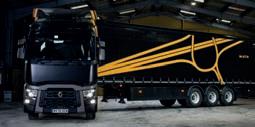
Instead, it set out to develop a beautifully simple graphic homage to the intricate design of motorway junctions.
Each junction (in a series of 20) was specially selected not only for its beauty, but also to celebrate the locations of some of the company’s most trusted and long-standing customers.
Judges said: “A brilliantly bold and distinctive design; this livery is completely different to the industry standard approach and is very stylish and eye catching, with each trailer series being unique.”
Kinaxia Logsitics
Kinaxia Logistics is a fast-growing company in the UK transport and warehouse sector. It has been built over the past 12 years by the acquisition of 13 profitable, privately owned companies, which now work together as a business that “combines local heritage and empathy within a dynamic national infrastructure that is distinctively Kinaxia”. As part of its ambitious growth plans, the company has designed a Kinaxia-branded livery that unifies all 13 acquired businesses. By the end of 2023, 50% of the company’s 1,872 assets will be in the new Kinaxia Logistics livery.

Judges said: “A clever way to bring consistency to 13 different operational companies that is distinctive and yet retains heritage; the speed of roll out is particularly impressive across this size of fleet.”
Partnered with
Onpoint
Onpoint's livery had remained largely unchanged since 2013. Over the past few years the business has expanded rapidly, from a fleet of 45 with one operating site and a £6m turnover, to a fleet of 100 across three sites with a £14m turnover. Formerly a local Midlands haulier, Onpoint has become a global logistics company with extremely high standards, requiring a modern, impactful livery to convey that message and quickly communicate its key services and expertise. Designed by an agency, it has been rolled out to 14 new trailers, resulting in elevated brand awareness and enquiries.

Judges said: “A good crisp design and a well thought through development of the previous existing livery; keeping the Union Jack colours maintains the strong British identity; the new livery is very striking and modern.”
Pall-Ex
Supporting current and ex-armed forces personnel is a key objective for Pall-Ex Group, demonstrated by receiving the Employer Recognition Scheme Gold Award from the Ministry of Defence in 2022. In celebration of this achievement, the business designed a special camouflageinspired livery to raise awareness of the Armed Forces Covenant and to highlight its opportunities for cadets, reservists and veterans. Pall-Ex Group is one of just 18 transport and logistics companies in the UK to hold this prestigious accolade, so designing this impactful livery was a great way to shout about the achievement.
Judges said: “A very impressive livery, with the camouflage design lending itself well to the different colours of individual Pall-ex members brands. The armed forces link also conveys values of trust, strength and reliability back onto the Pall-ex brand.”
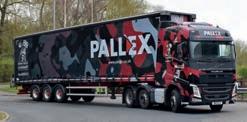
Reynolds Catering Supplies – Solstice Brand



The new design is part of the full rebranding of Reynolds’ Solstice brand. The previous livery was seen as dated and not portraying enough of the brand’s premium service and quality. Reynolds wanted it to be eye catching, with colours that convey a premium and ‘foody feel’. Reynolds chose Royal Blue as the new signature colour for Solstice as it is noticeable, and gives depth as a background to complement the traditional Solstice orange. The aim is to be clear, simple and visual to showcase delicious produce in season.
Judges said: “A really eye-catching and bold rebrand and a total modernisation from the initial branding; strong brand statement. Love the bright delicious oranges against the blue backdrop.”
56 MotorTransport 26.6.23






MT Awards 2023 shortlists

Low Carbon Award
Arla
Through creation of strategic roadmaps alongside its partners and data capture into its emissions reporting suite, Arla is aiming to make its carbon footprint transparent and plans to achieve its targets clear. In the logistics part of the business, carbon emissions have already seen a 25% reduction between 2015-2021 (37,000T CO2e). Arla continues to deliver tangible emissions reductions through innovative customer collaboration, route optimisation and transitioning towards alternative fuels; all of which has resulted in a further 7,636T CO2e reduction in 2022. Furthermore, early 2030 forecasts show the business is set to exceed its 39% reduction target.
Judges said: “SBTI target-setting with strong supply chain engagement and a wide variety of initiatives, producing significant savings; the green electricity implementation demonstrates that all areas of the business are being reviewed.”
EV Cargo
A signatory to UN Global Compact, EV Cargo has made significant progress in sustainability, particularly around decarbonisation, focusing on becoming carbon neutral by 2030. It has set ESG targets, measured its baseline emissions for the first time and produced its inaugural Sustainability Report. It delivered significant emissions reductions utilising alternative fuels, technology and by concentrating on fewer and friendlier miles. It used HVO fuel to save 4,448 tCO2e by switching 5.4 million delivery km from diesel and avoided Scope 3 emissions, saving 153,381 tCO2e during 2021.
Judges said: “SBTI target-setting with clear ambitions for 2030 and beyond; several initiatives implemented with a focus on accurate statistics and a clear roadmap.”
Nicholls Transport
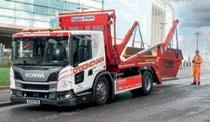
While others were parking up their LNG gas trucks in 2022 because of the fuel crisis, Nicholls (EH Nicholls Jnr) continued to run its fleet of LNG trucks because they believed it was the right thing to do for the planet. In 2022, Nicholls Transport achieved a 191% saving on GHG Emissions compared to fossil fuel (pump diesel) from July to December, which equates to saving circa 1,928 tonnes of CO2 for this six-month period. The company also runs a number of other carbon-saving initiatives such as the use of electric forklifts and electric vans, rainwater harvesting and enough photovoltaic cells to run 80% of its 14-acre site.
Judges said: “Sizeable number of LNG vehicles, a fuelling station, utilisation of solar energy and an ESG policy are commendable for a family business of this size, and an ‘in house’ ATF will both help the environment and operational performance.”
Partnered with



O’Donovan Waste Disposal
O’Donovan Waste Disposal places greener initiatives and environmental performance at the forefront of the business. The firm has implemented several initiatives, in a top-down approach, to reduce the carbon emissions of its fleet, reduce air pollution and introduce more efficient driving. The company leads from the front, demonstrated through its pledge to achieve net-zero carbon emissions by 2035, through its eco fleet procurement policies, training, vehicle enhancements and promoting a greener culture to improve O’Donovan’s credentials across the operation and set the benchmark for the industry.
Judges said: “Clear and ambitious net zero by 2035 target; full fleet of 100 x vehicles using HVO, and several initiatives including solar energy, rainwater harvesting, driver performance and telematics.”

Speedy
Speedy has committed to science-based targets to meet net-zero emissions. It aims to help contractors reduce their own supply chain emissions through zerocarbon equipment delivery and running its own heavy fleet on HVO while delivering HVO to customers. The business operates a 27-tonne electric truck, two 7.5-tonne HGVs and more than 150 electric vans nationally. It will boost this with a recent order for 150 more electric vans, which will be distributed nationally to replace ICE models within the fleet. Speedy’s strategy is to replace over 60% of all its commercials with fully EV by 2030, with the remainder running on HVO. It has also explored the use of sustainable river freight in London, which it aims to expand.
Judges said: “Strong measurement and reporting with science-based targets; significant investment in BEVs made and grey fleet savings achieved. Successful trial of waterborne freight with plans to expand.”
XPO Logistics

A total of 20,731 tonnes of CO2e were saved by XPO Logistics across its UK business in 2022 alone, with its long-term partner British Gypsum providing a considerable proportion of this reduction. In 2022, XPO deployed a significant volume of new vehicles fuelled by LNG, amounting to 10% of the British Gypsum fleet, and has now switched more than 100 vehicles to HVO via the installation of two fuel bunkers in Nottinghamshire and East Sussex. Over 1.2 million litres of HVO have been used in place of diesel since October 2022 alone, with the whole British Gypsum fleet operating via sustainable fuels by year-end. XPO is also partnering with British Gypsum to do further fully electric HGV trials this year.
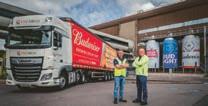

Judges said: “Impressive fleet of LNG and HVO fuelled vehicles with fuel bunkers; trialling of EVs is positive and driver training programmes complement the low-carbon initiatives.”
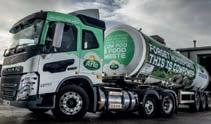
58 MotorTransport 26.6.23





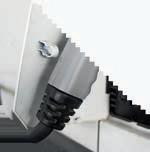




New Talent Development Award MT Awards 2023 shortlists

Partnered with



DFDS
DFDS has been identifying its talent needs for today and tomorrow. The business has prioritised succession planning and implemented specialist recruitment tools to achieve its objectives. For example, a ‘talent grid’ for the UK and Ireland identifies where talent at every level is based and cross references this with available roles, as well as the level of development that the new colleague might require. The business also identifies mobility, flight risk and ensures succession plans are in place across the organisation, in order to identify internal candidates for promotional roles. It continues to look ahead with regards to recruiting and retraining with its graduate scheme, for example, which is now on its fifth cohort.
Judges said: “DFDS has introduced apprenticeships at all levels from 2 to 7 and created an impressive pathway to provide an aspiration for all employees and to enable them to train and progress; excellent retention results.”
DPD
DPD’s company strategy places the highest emphasis on recruiting and developing customer-centric people who can deliver optimum levels of service to the UK’s leading retailers. The company strongly believes that bringing new blood into the industry helps to future-proof the business and has launched a broad range of initiatives to develop and retain new talent. These include training 68 warehouse operatives and 62 apprentices to become LGV drivers, developing 30 warehouse operatives into management roles and attracting 200 graduates into head office and network positions. DPD’s approach has been praised by industry qualification bodies and higher education institutions.
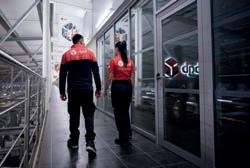
Judges said: “Amazing to see the results and that DPD is bringing new people into the industry; the entry demonstrates a clear people strategy focused on both the business and the wider sector.”
Moody Logistics and Storage
Moody Logistics and Storage is successfully overcoming the national shortfall in qualified drivers by attracting a new generation from a range of backgrounds and experiences into the profession through its own in-house driver apprenticeship scheme. It is also supporting its current Class 2 qualified drivers to gain their Class 1 licences to enhance their skills while improving the flexibility and
responsiveness of the business. In addition, it is promoting pathways to career progression within the business that enable it to retain talent and promote staff retention.
Judges said: “Moody Logistics has developed its own training programmes for driving and warehouse staff, which have helped with staff retention and avoided the HGV driver shortage issues; fantastic case study that highlighted the work taking place.”
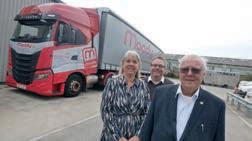


Speedy Freight
Speedy Freight is passionate about the onboarding, retention, and development of its team members. The launch of a brand-new Training Academy in September 2021 marked a new phase in Speedy’s evolution, that it said highlighted its dedication and investment into developing new talent. By making its existing employees and new recruits central to its plans, it has launched several initiatives to re-enforce a new Learning & Development (L&D) pathway that runs through the entire network and encompasses all areas of the business.
Judges said: “Investment in the new Training Academy and Speedy’s approach to providing development opportunities for all staff has enabled the business to grow; a strong entry with good testimonials from new talent.”
Stanton Logistics

Stanton Logistics credits its strong team of experienced professionals and network of partners with its success as a lean and agile business. It couples this with a passion for talent development and helping employees to reach their potential. It has shaped part of its pallet network operation to support its HGV driver apprenticeship scheme, as well as providing apprenticeship placements for the transport office and fleet team. The business actively engages with the local community and works with local schools and colleges to help students gain skills, including providing mock interviews, insight into logistics careers and the chance to take part in a management meeting. Stanton has steady plans for growth with a fourth UK location coming to fruition in 2023.
Judges said: “The rapid growth of Stanton Logistics has been supported by the introduction of apprenticeships at all levels across the business; really commendable activities at a relatively small operator; great community work and investment in HR.”
60 MotorTransport 26.6.23







MT Awards 2023 shortlists

Operational Excellence Award
Partnered with

Abbey Logistics
Abbey believes its operations department is fundamental to the success of its business and customers. The company aims to consistently go above and beyond the call of duty to ensure that its products and services are delivered on time and to the required quality to satisfy customers.
Its entry illustrated the challenges associated with the distribution of bulk products and how its team of professionals navigated them, came up with ingenious solutions, created opportunities, and improved Abbey’s overall performance.
Abbey provides flexible, reliable services and peak volume capacity, identifies cost reduction and cost control, and is a highly resilient supply chain partner that manages adverse events and lets customers focus on production and sales while maintaining efficient and continuous improvement reporting.
“This is a slick and relevant company with an excellent compliance record,” said one of our judges. “Abbey delivered 98% on time and in full. It understands and excels in a complex sector and this reflects in customer satisfaction. It is also passionate about safety and compliance.”
DFDS Logistics
DFDS Logistics takes pride in delivering a holistic logistics solution. This can only be achieved with operational excellence and in the past year it has again raised the bar through measurable objectives.
For example, it increased equipment by 15%, reported no prohibitions and maintained a green OCRS score.
DFDS is also a company that prioritises driver welfare. It seeks to continuously improve driver facilities and boost retention. It also successfully collaborates with customers and partners on innovation. With a fleet of over 200 vehicles and 400 trailers, it has maintained an excellent level of compliance, travelling more than 14.2 million miles. On-time delivery has consistently exceeded targets, while customer satisfaction has increased.
“DFDS presents a comprehensive story, well articulated with strong proof points,” one judge concluded. “A very solid submission; the company is doing all the right things and has demonstrated excellent fleet management. This is a focussed and dynamic business with exceptionally high standards.”
JPE Holdings


Based in the West Midlands, JPE Holdings is a family-based company that since 1994 has specialised in the delivery of virgin, recycled and blended aggregates. The company also owns three quarries and excavates, delivers and collects upwards of 1.25 million tonnes of aggregates every year for customers in the construction and highways industries.

Central to the business is its fleet of 35 rugged Volvo 8-wheelers, two Volvo Grab Wagons, seven Volvo FH artics and trailers, and a team that is committed to operational and technological excellence. Together, this drives the company’s impressive compliance scheme and safety records.

JPE is a member of the DVSA’s Earned Recognition Scheme (ER), with an overall weighted compliance score of 99.52% for both drivers and vehicles. The most recent driver’s tachograph infringement count is 99.64% compliant and JPE upholds third-party industry standards including FORS Gold, HS2 and TfL accreditation.
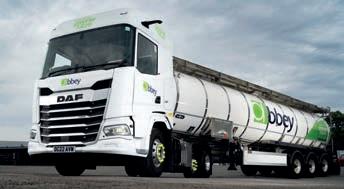

“JPE has an excellent record for compliance and safety,” said one of our judges. “This is an impressive story with excellent proof points and use of data.”
Wren Kitchens
Privately owned and selffunded, Wren Kitchens designs, manufactures and delivers its products in-house. It owns its own supply chain from manufacture to delivery, ensuring ultimate control, consistency and maximised opportunities for improvement. Last year the retailer maintained a consistent, high level focus on compliance, operational efficiencies, reducing downtime and vehicle maintenance.
Its wider focus was about adding value, increasing customer satisfaction, expanding people/skills development opportunities and new/improved production facilities whilst maintaining the highest levels of safety and wellbeing and keeping environmental goals on track. This strategy aims to ensure that Wren is best placed to take advantage of growth opportunities once consumer confidence and economic stability returns.
Despite a tumultuous year for retail, Wren enjoyed a 13th consecutive year of sustainable growth. Kitchen deliveries were up 16.3% and the company delivered more than 2,500 kitchens each week with a consistent OTIF of 97%.
“Wren again performed strongly and is very good on compliance,” one judge said. “The company fully understands the value of operational excellence. The transport side is clearly focused on delivering continual improvement.”
62 MotorTransport 26.6.23

MT Awards 2023 shortlists

Partnership Award
Bowker Transport, Thomas Hardie Commercials and Volvo Trucks UK & Ireland


Bowker Transport has been in business for 104 years, yet has only ever operated three brands of truck – and for the last 51 years it’s been a purely Volvo fleet. Furthermore, since local dealer Thomas Hardie Commercials was established in 1985, it has been the exclusive supplier.

The relationship is a perfect example of how the Bowker family likes to develop a true partnership with its suppliers – and this entry highlights the unparalleled business benefits that has afforded all three partners.
“Truck supply shouldn’t be taken for granted, nor the after-sales service,” said one of our judges. “This relationship is testament to how both businesses have invested time in each other.”
Construct IT and Wienerberger
Construct IT is focused on providing the best construction haulage in the industry, and with Wienerberger being the world’s largest producer of bricks, it says the synergies between the two businesses were easy to spot.
In April 2021, Construct IT became the lead haulier at Wienerberger UK’s Sandown Works with a view to ‘sharing the load’ and providing reciprocal learnings across the operations. Since then the relationship between the companies has grown from one of supplier to that of trusted partner.
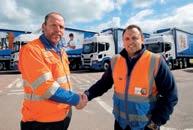
“To have grown the commitment from Wienerberger in such a short space of time and delivered dual branding and exceptional H&S is an exceptional achievement,” said one of our judges.
Menzies Distribution Solutions and TIP Group
In 2011, the relationship between Menzies Distribution Solutions (MDS) and TIP Group began with the need for nationwide trailer maintenance support.
Over 12 years later, TIP now supports MDS by providing a complete range of short-term rental, long-term leasing, maintenance, repair, and other services and is integral to its success.
Working as a team, the relationship continually evolves to meet the expanding needs of MDS, and together, the two companies continue to grow and enjoy market-leading compliance.
“A good example of a customer relationship and a clear demonstration of the commitment that supports growth,” said one of our judges. “It’s a true partnership where both businesses are invested in the success of each other.”
Partnered with


Moran Logistics and Moy Park
Moran Logistics & Moy Park started their relationship on a tactical basis, with Moran supporting Moy during a period of peak demand, where its current operation was under significant pressure. This relationship quickly cemented, as it became apparent to both parties that they were a great cultural fit for one another.

It was then that the hard work began, in building a truly collaborative solution for poultry logistics, which would elevate ways of working and systems through a shared purpose of developing something genuinely tailored, beyond “fit for purpose” and underpinned by a drive towards best in class performance.
“A great example of how a partnership can drive improvements and efficiency,” concluded one of our judges.
Speedy Freight and Ekornes
Founded in 2006, Speedy Freight pledges to get to the heart of each job and make high quality logistics solutions simple. A key driver for its warehousing expansion was to support long-standing client Ekornes, Norway’s largest furniture producer.
Speedy offers a step-by-step import service, handling everything from customs to co-ordinating the entire import process to reduce the risk of disruptions and delays at UK borders.
It stores products in three warehouses in Glasgow, Cheshire and Northamptonshire and delivers to 165 independent retailers in bulk as well as direct to customers’ homes.
“Speedy demonstrated an excellent way of working and integration with Ekornes,” said one of our judges. “It delivers an excellent service for Ekornes’ product and distribution.”
XPO Logistics and Saint-Gobain UK & Ireland


XPO Logistics and Saint-Gobain UK & Ireland have created a ‘One Team’ approach based on collaboration and trust. Together, they run an effective supply chain solution with aims and achievements based on risk, reward and transparency.
As a result, they have not only significantly reduced carbon emissions and increased the safety of operations, but the partnership has evolved to encompass nine brands in the Saint-Gobain portfolio. XPO plans to accelerate its joint network efficiencies even further as one team.
“An excellent submission based on safety, sustainability and efficiency built on a clear partnership platform,” concluded one of our judges. “You can’t grow as fast as they have together unless you have an embedded understanding between you and work as one. Exceptional.”
64 MotorTransport 26.6.23









MT Awards 2023 shortlists

Safety in Operation Award
Partnered with


Air Products
Air Products’ goal is to be the safest industrial gas company with a target of zero accidents/incidents. Its fleet of 353 drivers and 278 vehicles makes around 220,000 deliveries to 10,000 UK customers each year, ranging from large industrial facilities to small leisure environments.



Obstructive sleep apnoea (OSA) is a relatively common condition, and drivers are a high-risk group, with statistics suggesting that better identification and treatment of OSA in the heavy goods transport industry could prevent up to 40,000 road accidents every year.
Many drivers don’t come forward with symptoms however, for fear of having their licence suspended or revoked. In 2022, Air Products launched a voluntary OSA programme to break the taboo and raise awareness. The programme has already made progress in reassuring drivers that help is available without penalty, screening those at risk, and diagnosing and treating where appropriate.
Our judges said: “Well done Air Products – this is quite often an area that’s forgotten or just taken for granted. Identifying and reducing a risk is a fantastic leap for their staff wellbeing.
“A safe business, with a great initiative that is dealing with an unspoken issue that affects many.
“Sleep apnoea has been a topic of conversation for many years and it’s admirable that the company has tackled the problem head-on.”
CLEAN Linen & Workwear
ROSPA Fleet Safety Gold award winner, Earned Recognition member and Royal Warrant holder, CLEAN Linen & Workwear’s 975 employees operate 100 HGVs across seven sites serving 5,500 clients in the hotel, restaurant, automotive, engineering and pharmaceutical sectors. It is one of the UK’s leading independent laundry companies providing professional linen and work wear rental services.
Through the development, adoption and implementation of its CLEAN Health & Safety strategy, CLEAN is increasingly a Safer Workplace for all.
It is imperative to CLEAN that it always looks to innovate and the company reviewed its incident investigation process to clearly identify the root cause of all collisions and near misses and to enable it to have a clear vision on how
collaboration with all key stakeholders should take place and to further demonstrate clear areas for improvement and training. CLEAN’s transport division has compliance, safety, service and training as overarching business principals, which are entrenched in its “everyday excellence” motto.
Our judges said: “An excellent submission meeting all criteria. It followed a very structured approach, demonstrating results with benefits to the company and employees.
“Great to see the engagement with drivers to ensure their wellbeing is taken into consideration. Rolling the initiative out across the business shows real commitment to safety.
“This company has gone to a third party for assistance in reducing collisions and accidents and has run with it.”

Pall-Ex UK
Leading pallet network Pall-Ex has demonstrated a strong commitment to safety in operations by addressing key areas within its central hub in Leicestershire. With 60 FLTs, 180 night and 70 day vehicles moving over 10,000 pallets through the 220,000sq ft hub during peak times, there is increasing need for safety policies to control risk.
While the vast majority of incidents were not related to personal injuries but resulted in damage to equipment and property, Pall-Ex is committed to setting an industryleading safety-first culture, generating pioneering benefits for the working environment.
Through a series of comprehensive changes in processes, education, and continuous improvement initiatives, Pall-Ex has significantly reduced incidents and maintained a safe working environment for its employees.
Pall-Ex’s industry-leading H&S system ensures everyone onsite, including hundreds of visiting drivers, are trained in H&S regulations, ensuring safety excellence. Arriving drivers are required to present ID cards as evidence of training. If not in place, the hub will train the driver before giving access to the site.
Together with a range of other measures, annual mechanical handling incidents have reduced by 63% year-on-year.
Our judges said: “An excellent submission with huge investments made across the operational site. All the statistics are heading in the right direction, and clearly asset management is better as the cost per asset is reducing too.
“Pall-Ex has demonstrated throughout its entry that it identified issues it had with safety in all of the areas of operation and has developed mechanisms to make the whole hub at Leicester a safe working environment safe for staff – and safer for vehicles.
“I believe that their motto “achieving excellence together” is proven within this entry.”
66 MotorTransport 26.6.23

Sustainable Transport Award MT Awards 2023 shortlists

Partnered with

Boughey Distribution


During 2022, Boughey Distribution set itself ambitious targets for its sustainability programme and with the aim of producing the company’s first Impact Report after setting out on a journey to become B Corp certified.
With the Impact Report completed, the company has aspirations not only to achieve accreditation but, in time, to become a leader and champion of B Corp within the transport and distribution industry. At the heart of Boughey’s ESG Strategy has been ensuring all colleagues are informed and involved in initiatives, from understanding the importance of environmental sustainability and robust governance and commerciality for the future of the business, through to directly benefiting from initiatives introduced. As part of the annual review and appraisal process, the company’s team of managers have agreed objectives to drive social and environmental actions.
Judges said: “A strong submission from a medium-sized entity delivering from an increasingly profitable base a clear ESG strategy, and B Corp journey. Good staff involvement, and some impressive savings alongside investment in their people.”
DPD
DPD has environmental, social responsibility and corporate governance (ESG) policies woven into every aspect of its operation and fully embraced by its people. It is working at pace to decarbonise its entire operation and has put its people’s health and safety at the heart of its business.
Its initiatives are aligned with four key UN targets. Furthermore the company’s broad definition of sustainability extends beyond CO2 reduction targets to include the emotional wellbeing of its 20,000 people and a ground-breaking approach to supporting people with special educational needs and disabilities, as part of its comprehensive diversity and inclusion strategy.
Judges said: “Comprehensive set of ESG initiatives; some very noteworthy achievements, and clearly DPD has a strong social focus, recognising its brand presence and working to embrace alternative fuels in the operation.”
EV Cargo
Global logistics provider EV Cargo is guided by three core values – growth, innovation and sustainability – which lead all aspects of its business.
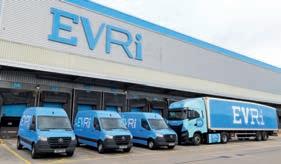

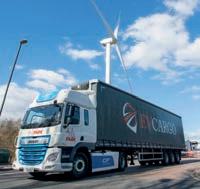

As a signatory to the UN Global Compact, EV Cargo has made significant progress in its sustainability strategy. From setting relevant ESG topics and targets, to measuring its emissions for the first time and
producing its inaugural Sustainability Report, EV Cargo is focused on becoming carbon neutral by 2030.
Over the past 24 months it has delivered significant emissions reductions alongside pioneering people, culture, safety, recruitment, engagement and diversity initiatives to deliver its sustainability strategy.
Judges said: “ESG principles and initiatives widely embedded into the business –emissions reduction, staff training, health and safety all covered; it is pleasing to see a focus on a diverse management structure, and in a challenging market have a robust recruitment plan.”
Evri
Evri has gone through a period of unprecedented growth, so recognises that it’s never been more important to acknowledge its impact on the planet. It states: “We’ve always been a responsible carrier but in the last year we’ve doubled down on our commitment to become an even more sustainable and ethical business”.
Evri has launched an ambitious ESG strategy and appointed a team to steer this and embed ESG principles into its business culture. It has also expanded its bio-CNG and electric-powered fleet, and achieved 100% renewable energy in its operations, as the business moves towards its net-zero emissions target of 2035.
Judges said: “New ESG strategy launched and good evidence of it working; Evri has clearly identified ESG as a priority, and made a strong start to implementing this, including engagement of its people, setting awareness and training goals.”
Nicholls Transport

Nicholls Transport constructed its site to be sustainable – photovoltaic cells cover the roofs of its building while rainwater that falls on the site is harvested to run its truck wash. Training drivers through the driver shortage, investing in LNG trucks that are producing 191% less GHG emissions then a diesel truck, supporting schools in Africa and having an MD who is listed in the top 100 people influencing the reduction in CO2 in the transport industry are further evidence of its credentials.
Judges said: “Nicholls Transport clearly has strong principles in terms of financial planning, making it resilient and able to manage a crisis such as Covid. It clearly has strong ideals and principles around the environment, its employees and wider social engagement, which it both conveys to and engages its people in.”
68 MotorTransport 26.6.23



MT Awards 2023 shortlists

Team of the Year
Abbey Logistics Group
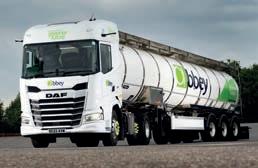
Abbey Logistics says its finance team is the engine that’s gone ‘above and beyond’ to drive continuous improvement in performance over the past four years, and particularly the past 12 months.
They have on-site involvement as well as additional responsibility for fleet, compliance, IT and payroll and have successfully navigated the challenges the business has faced as well as creating new opportunities, building strategies and improving Abbey’s overall performance.
“Abbey has demonstrated exceptional teamwork and an investment in young people,” said one of our judges. “The finance team are at the heart of the operation and are empowered to make important business decisions.”
Collett & Sons
The Collett team used its 250-tonne Goldhofer girder bridge trailer to deliver two 215-tonne super grid transformers from GE Stafford to the Kintore substation in Aberdeenshire.
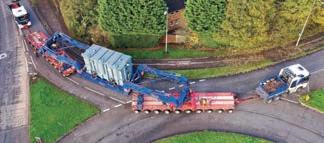
The team travelled for 70 miles over two days to Ellesmere Port with the first unit. Here it was lifted by a Liebherr LG1550 mobile crane, then loaded for shipment to Aberdeen, arriving three days later before being discharged via a 600-tonne strut crane to the girder bridge trailer. The team was then able to ‘jack and skid’ the transformer to site before returning for the second unit.
“This was a mammoth operation,” said judges. “It required internal and external teamwork, planning and expertise of the highest level.”
DFDS

DFDS Logistics says it has excelled in its fleet operations over the past year as a result of creating and developing a business partnering and projects team.
The team looks beyond day-to-day operations to form more lasting relationships with partners and to align the DFDS business more closely with theirs. The team also ensures that the business is operating in the most efficient and cost-effective way. It consists of a group of senior managers from a range of departments including finance, operations and projects. “The new team has successfully transformed major clients into business partners,” our judges explained.
Partnered with
Palletline
In 2022, following a review of its ownership model, Palletline launched Project 100% with the aim of achieving full network coverage.


The ambitious objective saw the team comprising network and operations, business information and IT, and commercial departments eliminate caretaker costs and dual networking. It also successfully updated the relationship it has with its members through the introduction of a detailed ‘cost to serve’ model, inter-member rate reviews and a host of other measures. Within 12 months Palletline achieved 100% member coverage with zero caretaker fees.
“These are great results from a very focused team,” said our judges.
Pall-Ex
Pall-Ex created a network management team to drive operational efficiency. Comprising of multiple internal departments spanning service compliance, hub operations and strategic member development, this team has taken a targeted approach to addressing key issues and implementing sustainable solutions. “This is an exceptional submission,” concluded one of our judges. “It is clear and concise, explains why the team came together and provides good detail on its results. All the key challenges were identified and objectives fully met.”
The Haulage Holdings Organisation




In January 2022 the government updated the status of Highly Pathogenic Avian Influenza (HPAI) in captive birds, poultry and wild birds. The Leo Group and Haulage Holdings were contracted to assist in the collection, transportation and disposal of diseased birds.
Operational teams were set up with a dedicated hot line to ensure a priority collection service was made available to farmers and producers. Haulage Holdings also used ADRregistered drivers and an additional training programme for them was undertaken. The firm identified a dedicated fleet of vehicles and trailers for the project including newly designed trailers with a durable designed sealed unit.
“An impressive response to a tough problem which required some strong teamwork,” said one of our judges.
26.6.23 70 MotorTransport



Training Award MT Awards 2023 shortlists

Partnered with






Explore Plant and Transport Solutions










Explore Plant and Transport Solutions’ Operational Training programme is a progressive learning journey developed to overcome the impacts of the HGV driver shortage.

The programme has become established as a core element in Explore’s recruitment strategy, exceeding expectations as a proven, sustainable method of welcoming new drivers. It uses a three-step bronze, silver and gold modular approach to training to ensure employees are competent and confident in all aspects of the role by completion.
As operations continue to expand into 2023, Explore will develop the scheme and launch it across additional divisions: Mixer, Heavy Haulage and Plant Hire.

Judges said: “This is a well-organised training programme that achieved what it set out to do with an impressive range of training materials and good mentoring programme; the route from bronze to gold is aspirational for trainees; the entry showed targeted and tangible results.”
Howdens Joinery

Howdens recognises that drivers make thousands of decisions during every driving shift. Information enters the eye at the same speed, but the ability to process the information and react quicker is a trainable skill.
The business partnered with performance coach Dr Sherylle Calder and her team at EyeGym. The programme trains drivers using computer-based drills to enhance reaction times, recognition and recall –all skills that are needed every shift when navigating safely on the road.
Howdens ensures employees are given dedicated time on their shifts to complete the drills. It then feeds back on overall cognitive performance. Since its introduction, the initiative has improved across every user within the business.
Judges said: “The EyeGym is an amazing idea for drivers, especially in our industry where there is a need to ensure that drivers are as ‘equipped’ and ‘sharp’ as possible; it is readily accepted by all the drivers, who have shown an improvement in their reaction times and hence a reduction in accidents.”
MTS
MTS is a leading company in waste haulage with a £70m turnover. Training is a vital element of the company’s operations to keep staff safe and ensure the compliant and satisfactory delivery of its services.
As part of its continuous drive to improve efficiency and reduce its costs, MTS found that with rising staff numbers and increased demand for courses from its clients, training costs were escalating, and an alternative delivery model was needed. Consequently, MTS created a vision for a dedicated training academy to meet its growing requirements, along with capacity to also deliver services for third parties.
The company’s academy is now delivering quality and focused training, ensuring a qualified and competent workforce that allows MTS to deliver a first-class service to its diverse customer base.


Judges said: “The training centre is remarkable and offering the drivers a five-day induction is great; it is really good to see the academy was opened up for use with third parties and the cost savings [it offers] compared to external provision.”
Palletline Logistics




Training has been integral to the continued growth and achievements of the company. Cultivating a culture of communication, collaboration and personal development has enabled each of the businesses and their employees to flourish.
A strong commitment to training each of Palletline Logistics’ 446 employees gives them the skills they need to give customers the best service possible, making them feel valued and minimising churn. Training initiatives are specific to the Palletline Logistics operation to encourage engagement, upskilling and retention. More than 75% of employees have undergone training over the past 12 months.
Judges said: “The organisational changes and acquisitions made by Palletline necessitated them undertaking a thorough analysis to identify the training needs of their staff. They developed twelve programmes to ensure there was a suitable development opportunity for every employee, which included Mental Health and Dignity at Work programmes.”
26.6.23 72 MotorTransport

MT Awards 2023 shortlists

Urban Operator of the Year
Partnered with
DPD
DPD continues to transform its urban operation with the expansion of pickup points and deployment of its all-electric fleet –30% of its vehicles now operate emission-free.
During 2022, DPD invested £111m switching 3,000 vehicles from diesel to electric (100% growth versus 2021), which delivered 35 million parcels, double the number achieved in 2021.

The parcel firm’s ‘Vision 30’ strategy to decarbonise deliveries in 30 UK cities by the end of 2023 saw diesel vehicles taken off streets in 21 UK cities in 2022.
DPD has trialled and implemented autonomous robot deliveries and used HVO to fuel 60% of its HGV fleet, whilst building strategic relationships with companies to expand its urban charging infrastructure, ensuring DPD can deliver clean in the urban environment.
It has also focused on road safety and rolled out VisionTrack in its HGVs; proactively lobbied central and local government to garner support to accelerate the UK achieving net zero; and instigated its own clean air programme, with over 400 sensors measuring pollutants in cities and sharing that data with consumers and local government.
The judges said: “DPD has demonstrated its commitment to changing both the urban and non-urban delivery landscape; the entry has shown how innovative and dynamic the road transport sector is, particularly in terms of urban operation.The scale of the EV rollout coupled to the Electric Cities initiative is particularly impressive, as is a wide roll-out of HVO while trialling an EV HDV.”
ELB
Optimising performance while managing the dynamic risk assessments required to operate within strict safety guidelines, ELB recognises that urban supply chain operators must be ever-vigilant of pedestrians and other vulnerable road users in densely populated environments.
The business has invested heavily in its fleet to ensure it is
fitted with the latest road safety equipment and optimised for efficiency.
It has also added two electric vans and is trialling an electric HGV, as well as continuing to use seven lithium battery-powered fork-lift trucks.
In the last 12 months, even though ELB’s fleet size has increased, it has improved miles per gallon from 8.91 in 2022 to 9.88 this year.
ELB has also managed to introduce out-of-hours deliveries into its pallet operation.

It has maintained its FORS Gold standard for the ninth consecutive year in 2023.

One judge said: “ELB operates in a challenging environment, where electrified vehicles are not always easy to make fit for purpose. By looking at the current vehicles of choice and concentrating on those areas where change can benefit operations and improve safety, the business is demonstrating its concern for all.”
Another commented: “FORS Gold standard across primarily a HGV fleet operating in London undoubtedly takes a huge amount of hard work and effort.”
Evri


Evri delivers around 750 million parcels every year.
At the end of 2021, it launched a comprehensive and ambitious strategy to reach net-zero direct and indirect carbon emissions by 2035.
As part of that roadmap, Evri is exploring active delivery models to create zero-emission final-mile delivery solutions, particularly in urban and congested areas.
The parcels firm is also eager to pursue innovative circular business models that will support its clients and customers.
Evri has conducted successful trials using street portering, in collaboration with Ford, at one of its London sites and explored an e-cargo bike operation in Driffield, East Yorkshire using e-bikes with a 2cu m capacity and able to carry 130 parcels.

During 2022, it has also partnered with zero-emission final-mile firm Zedify and continued to invest in its ParcelShop and Lockers network.
The judges said: “EVRI has actively embraced the challenges of last mile delivery and operation, through improvements in vehicle types and innovation, by select partnerships to bring added benefit to end users, the environment and staff; the trial of the various routes to the final mile delivery using e-bikes is an exceptional step forward for the home parcel delivery market, and could set the way or future for this heavily subscribed market.”
26.6.23 74 MotorTransport





































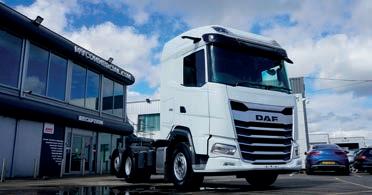



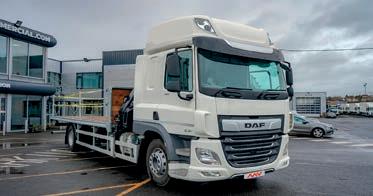

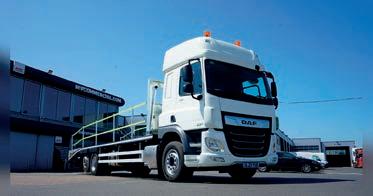

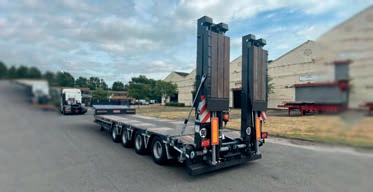


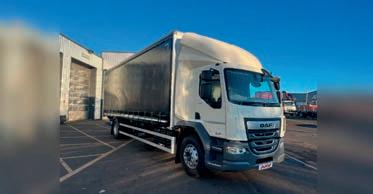






The next generation of Volvo Electric trucks, precision engineered for long-lasting construction and distribution performance, with zero tailpipe emissions.
Volvo FM Electric
Lower sound and emissions, with excellent ergonomics and visibility. The Volvo FM Electric is optimised for high-capacity deliveries in urban areas, offering quieter, greener performance.


Volvo FH Electric
Make your heavy inter-city deliveries cleaner and greener. The Volvo FH Electric performs powerfully, with outstanding cab comfort loved by drivers worldwide for long hours on the road.
Volvo FMX Electric
Deliver heavyweight loads, with minimal disturbance. The Volvo FMX Electric is engineered for construction excellence in places that demand quieter, cleaner performance.
Contact your local Volvo Trucks dealer about the full Volvo Electric range www.volvotrucks.co.uk Volvo Trucks. Driving Progress.

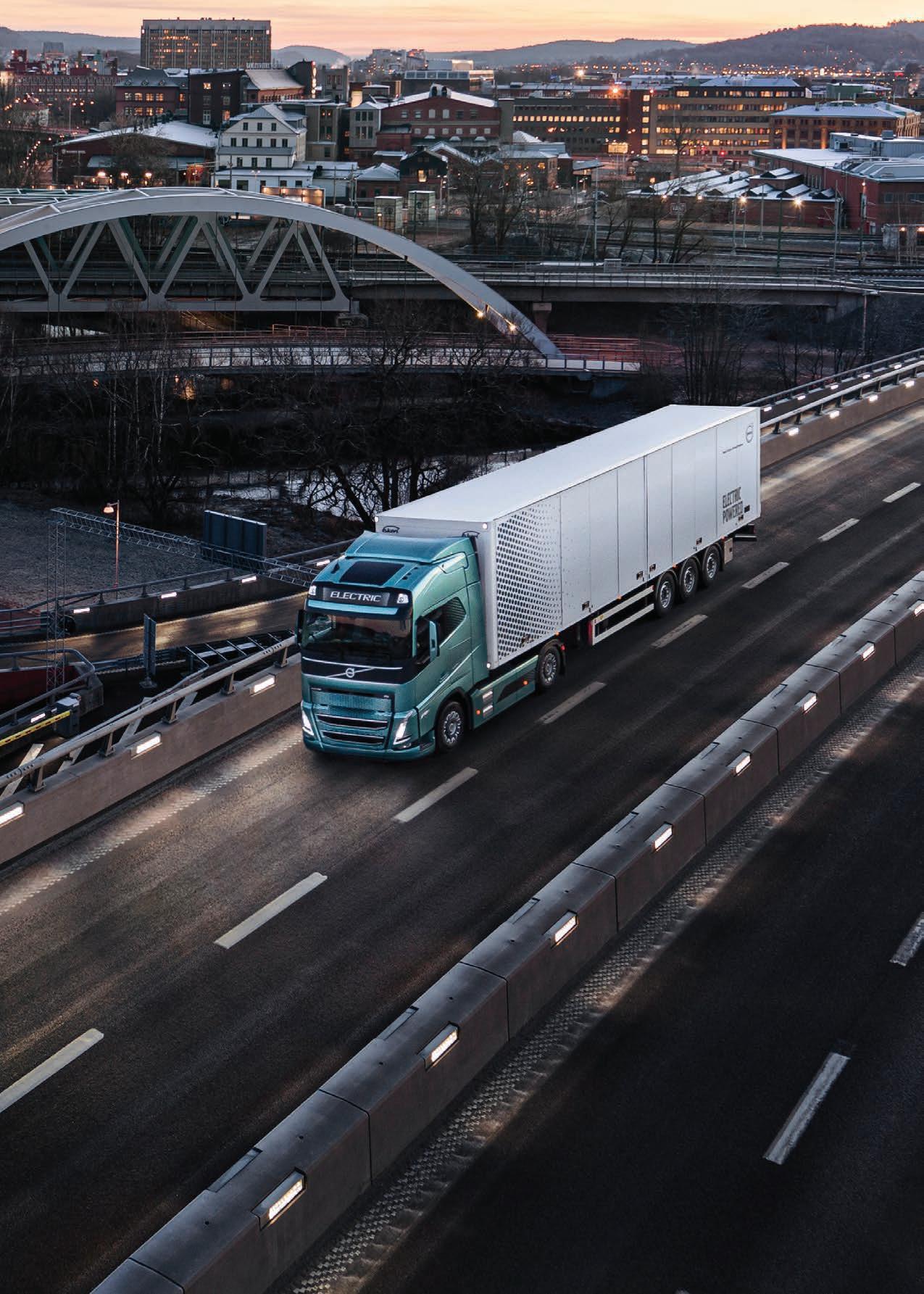 Volvo FH Electric
Volvo FH Electric



 Volvo FM Electric
Volvo FM Electric



















 By Carol Millett
By Carol Millett














































































































































































































































































































































































































































































































































































































































 Volvo FH Electric
Volvo FH Electric
